Have you ever wondered about the mesmerizing world of blue flowers? Just like a vast, azure sea stretching to the horizon, nature has gifted us with an array of blue blooms that can enchant anyone with their beauty. So, grab your gardening gloves and get ready to dive into the enchanting realm of blue flowers, where hues of cerulean, sapphire, and cobalt come together to create a visual masterpiece.
Blue flowers symbolize serenity, peace, and openness. Their blue pigments evoke a sense of calmness, making them perfect for creating a tranquil atmosphere in your garden. Whether you’re a seasoned gardener or just starting, having blue flowers in your garden can transform it into a serene oasis.
-
Blue Hydrangea (Hydrangea macrophylla)
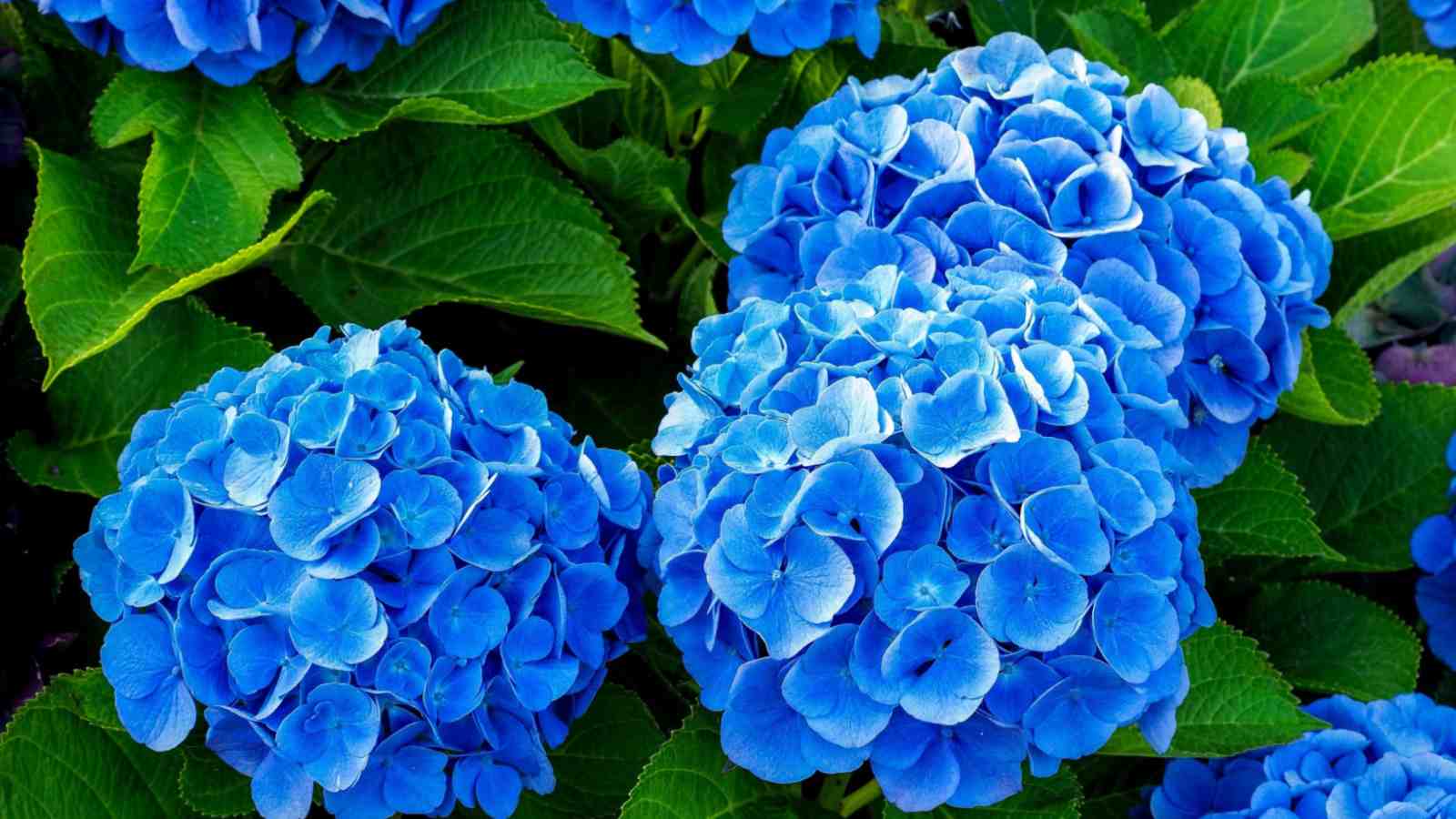
- Botanical Name: Hydrangea macrophylla
- Hardiness Zones: 5-9 (USDA)
- Plant Type: Deciduous Shrub
- Sun Exposure: Partial Shade
Blue Hydrangeas are known for their large, fluffy clusters of blue flowers. They prefer acidic soil and thrive in partial shade. Prune them after flowering to encourage new growth.
-
Morning Glory (Ipomoea purpurea)
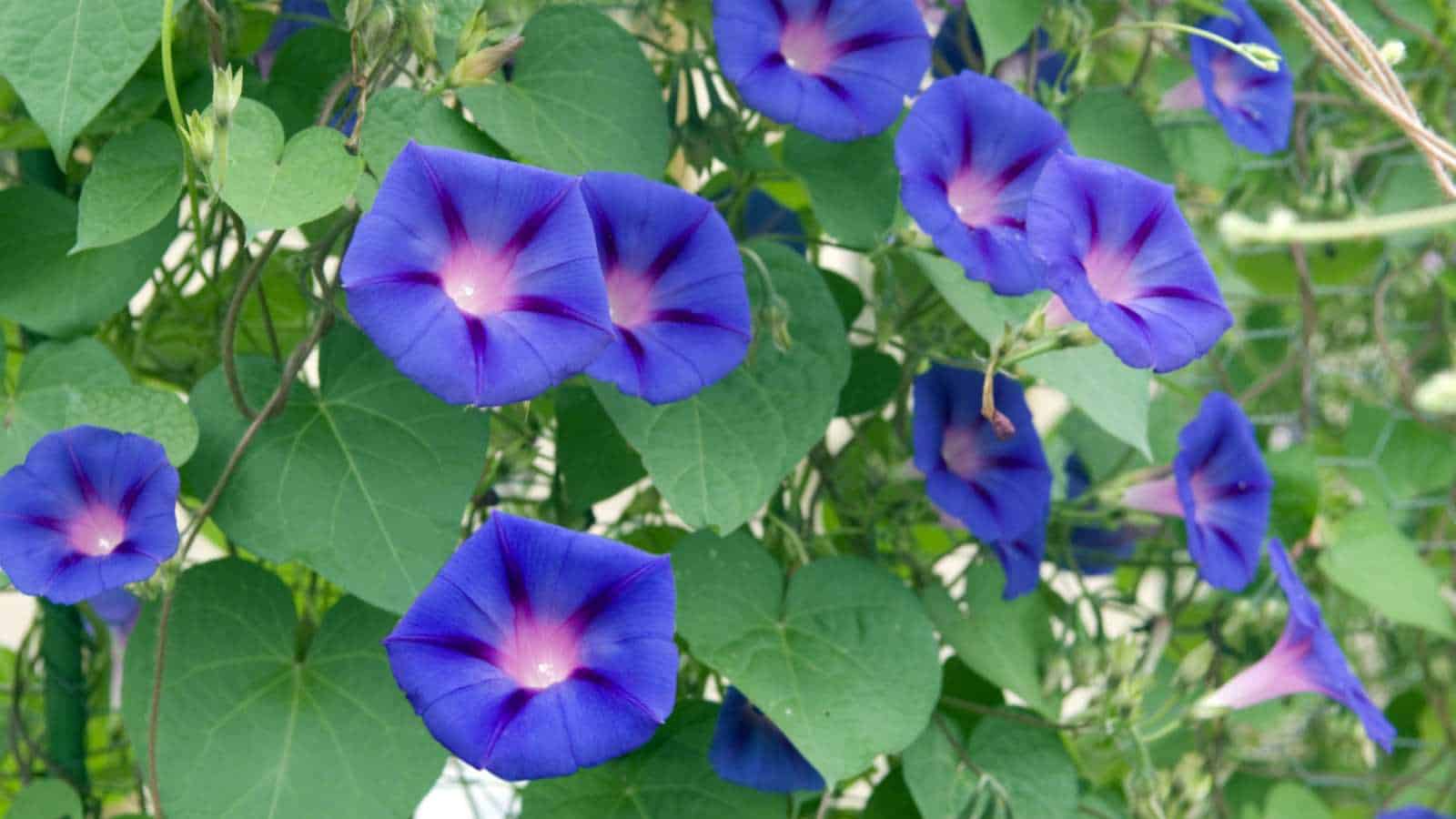
- Botanical Name: Ipomoea purpurea
- Hardiness Zones: 2-11 (USDA)
- Plant Type: Annual Vine
- Sun Exposure: Full Sun
Morning Glory vines produce vibrant blue, funnel-shaped flowers. They are easy to grow and climb, making them perfect for trellises. They bloom profusely in full sun.
-
Gentian (Gentiana)

- Botanical Name: Gentiana
- Hardiness Zones: 3-8 (USDA)
- Plant Type: Perennial
- Sun Exposure: Full Sun to Partial Shade
Gentian flowers are deep blue and trumpet-shaped. They thrive in moist, well-drained soil. Gentians are often used in herbal medicine for their bitter roots.
-
Balloon Flower (Platycodon grandiflorus)
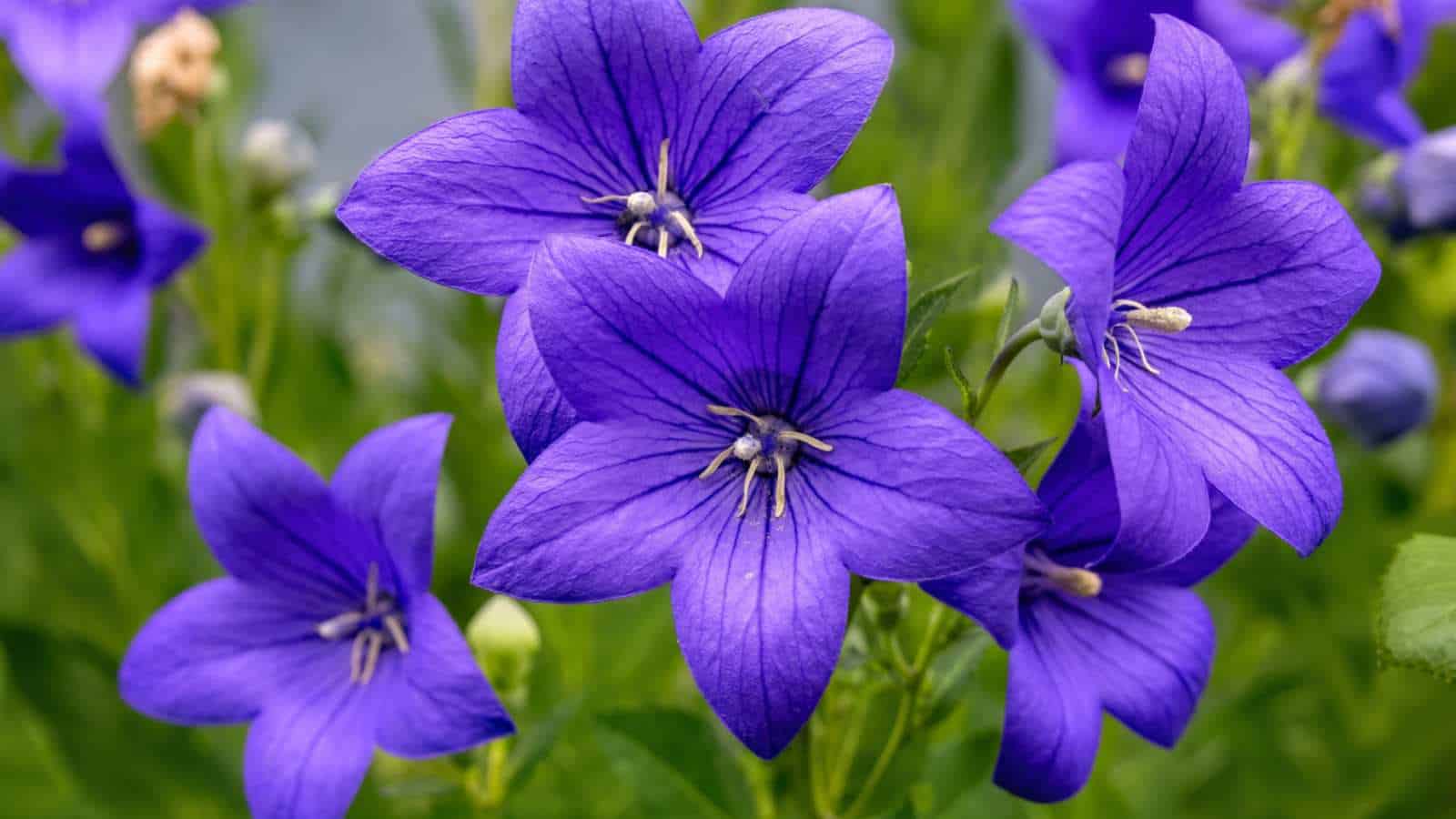
- Botanical Name: Platycodon grandiflorus
- Hardiness Zones: 3-9 (USDA)
- Plant Type: Perennial
- Sun Exposure: Full Sun to Partial Shade
Balloon Flowers are named for their balloon-like buds, which burst open into star-shaped blue blooms. They are low-maintenance and make excellent cut flowers.
-
Bluebell (Hyacinthoides non-scripta)
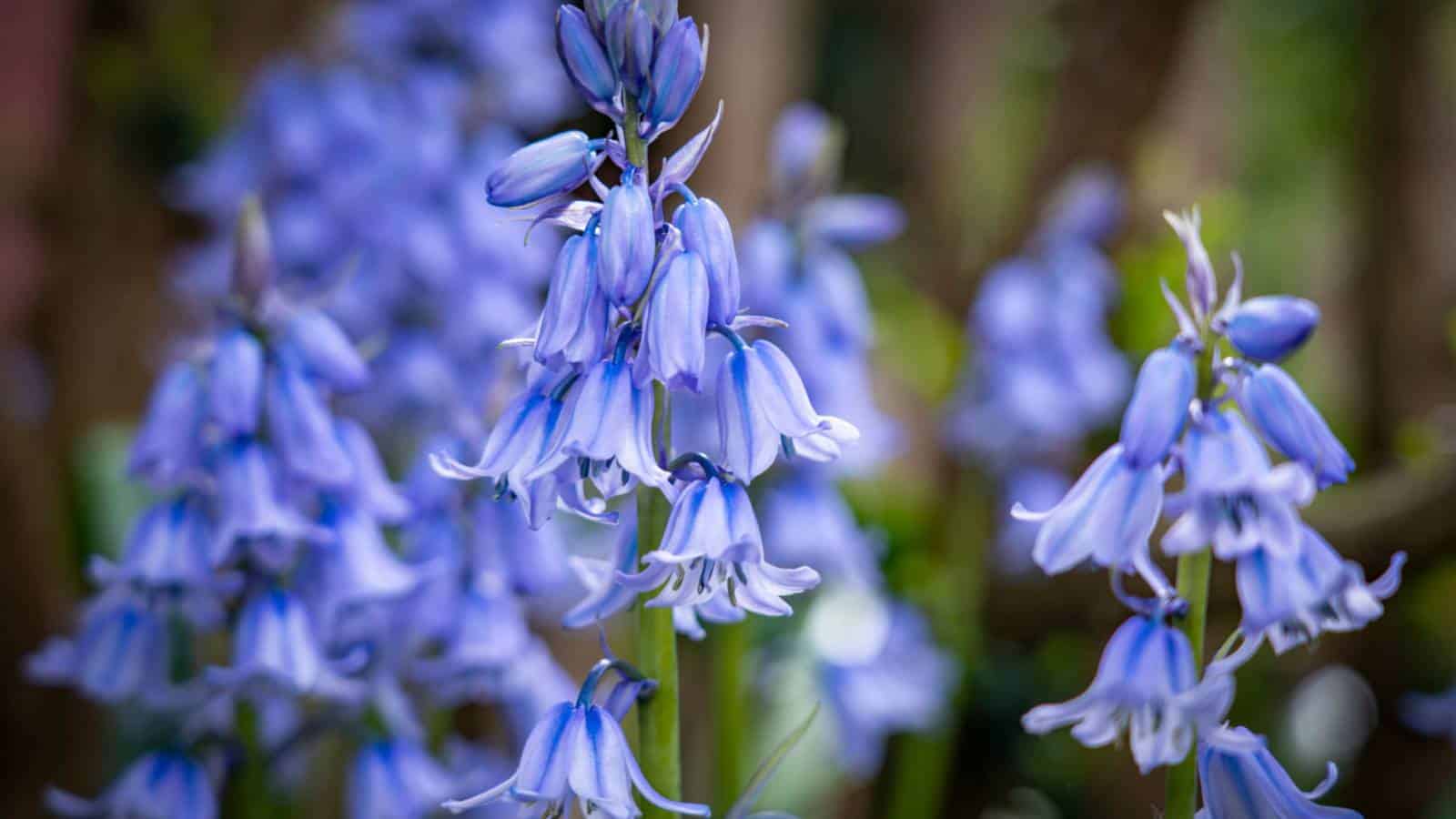
- Botanical Name: Hyacinthoides non-scripta
- Hardiness Zones: 3-8 (USDA)
- Plant Type: Bulbous Perennial
- Sun Exposure: Partial Shade to Full Shade
Bluebells are delicate, bell-shaped flowers that form in drooping clusters. They prefer woodland settings and naturalize well. Bluebells are excellent for shaded gardens.
-
Blue Sage (Salvia azurea)
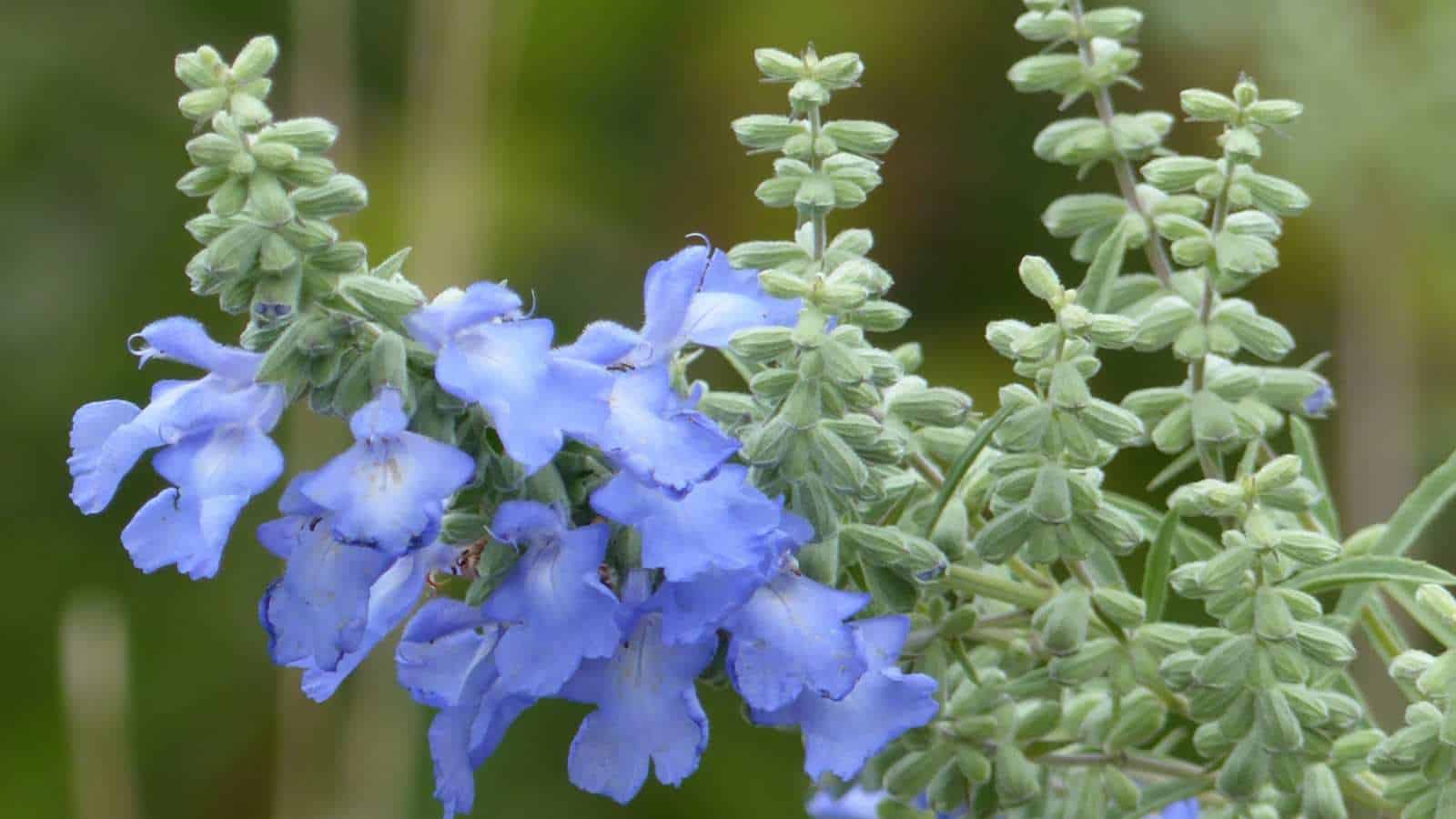
- Botanical Name: Salvia azurea
- Hardiness Zones: 5-9 (USDA)
- Plant Type: Perennial
- Sun Exposure: Full Sun
Blue Sage produces tall spikes of sky-blue flowers. It attracts butterflies and bees and is drought-tolerant once established. Pruning after flowering encourages bushier growth.
-
Delphinium (Delphinium)
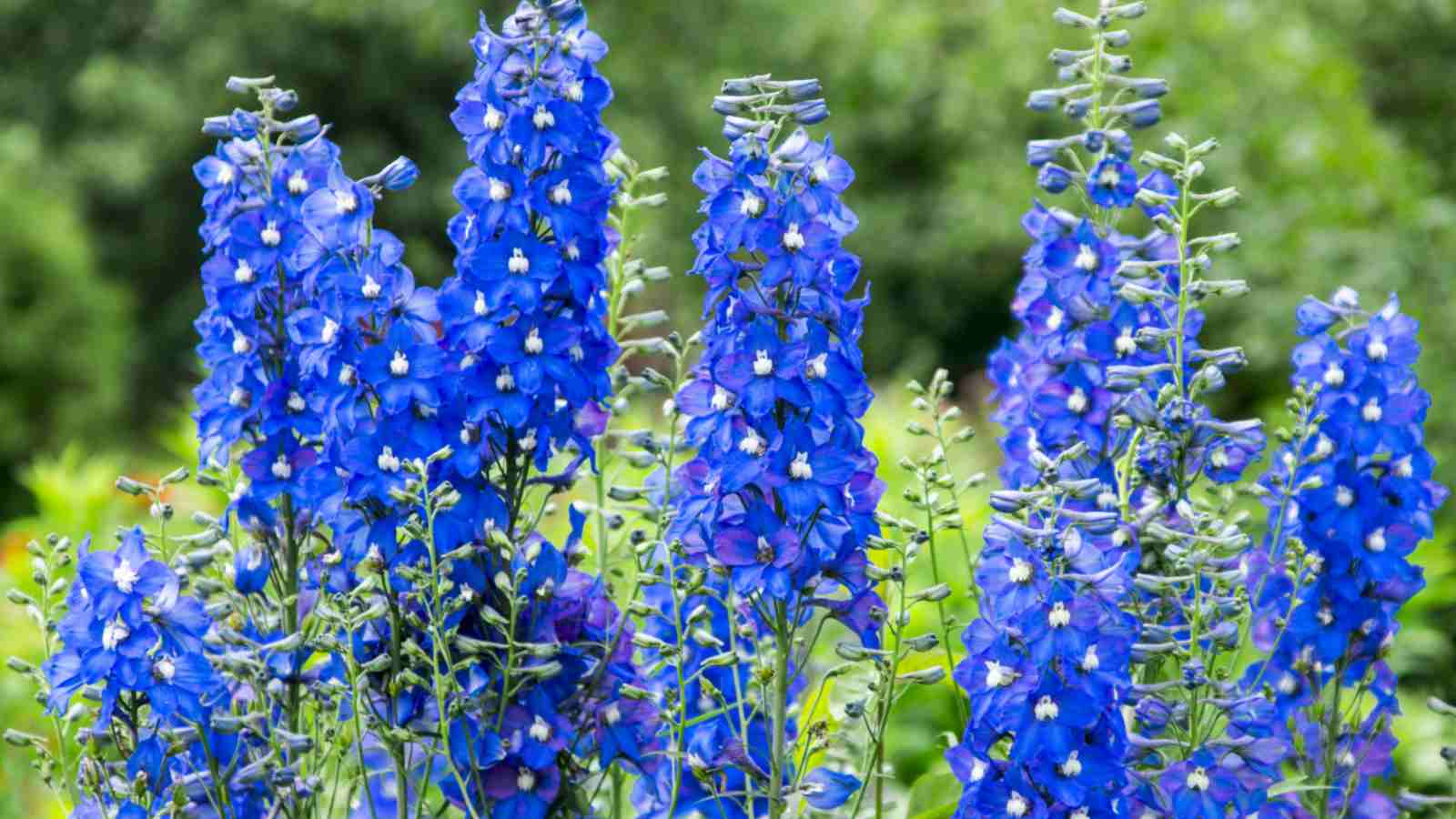
- Botanical Name: Delphinium
- Hardiness Zones: 3-7 (USDA)
- Plant Type: Perennial
- Sun Exposure: Full Sun
Delphiniums are tall, elegant plants with spikes of densely packed, vivid blue flowers. They require staking for support and well-drained soil. Regular deadheading prolongs blooming.
-
Blue Daisy (Felicia amelloides)
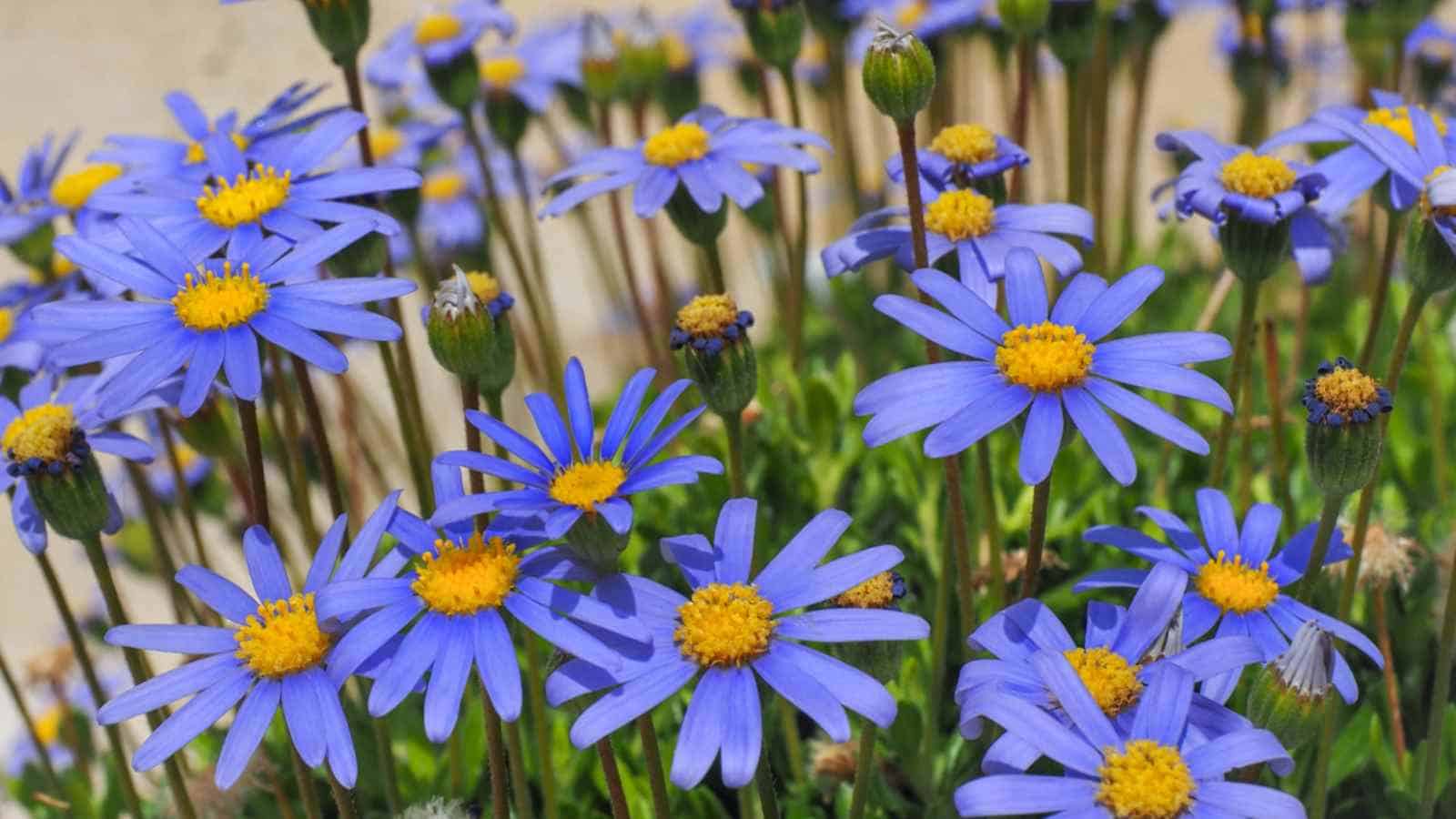
- Botanical Name: Felicia amelloides
- Hardiness Zones: 8-11 (USDA)
- Plant Type: Perennial
- Sun Exposure: Full Sun to Partial Shade
Blue Daisies have bright blue petals surrounding a yellow center. They are drought-tolerant and attract bees and butterflies. They make charming additions to rock gardens.
-
Blue Fescue Grass (Festuca glauca)

- Botanical Name: Festuca glauca
- Hardiness Zones: 4-8 (USDA)
- Plant Type: Ornamental Grass
- Sun Exposure: Full Sun
Blue Fescue Grass forms compact mounds of fine, blue-gray foliage. It’s ideal for edging, ground cover, or container planting. Trim back in early spring to rejuvenate growth.
-
Blue Lobelia (Lobelia siphilitica)
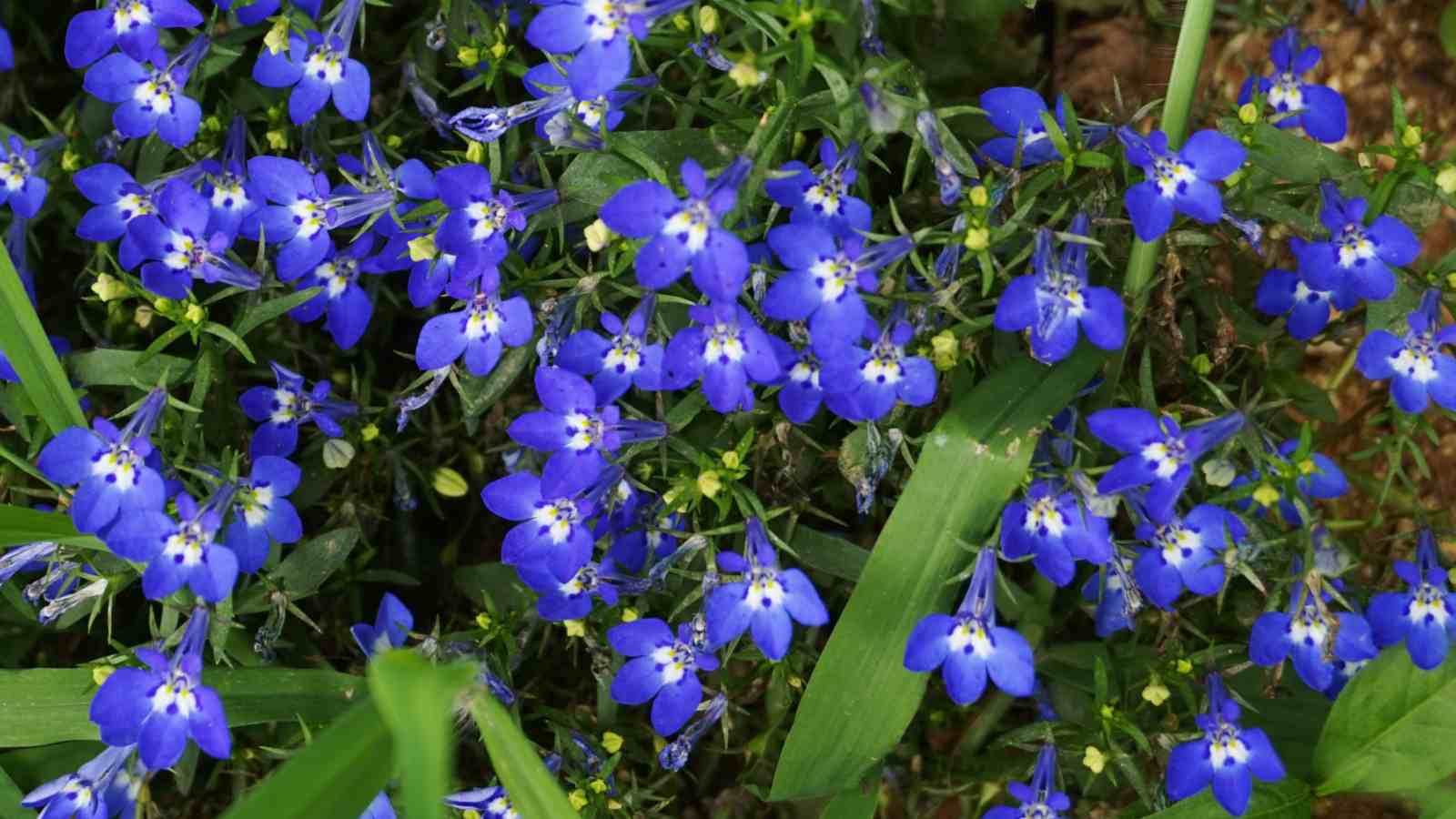
- Botanical Name: Lobelia siphilitica
- Hardiness Zones: 4-9 (USDA)
- Plant Type: Perennial
- Sun Exposure: Full Sun to Partial Shade
Blue Lobelia bears spires of intense blue flowers on upright stems. It thrives in moist soil and is perfect for rain gardens. Regular watering ensures prolonged blooming.
-
Blue Passion Flower (Passiflora caerulea)

- Botanical Name: Passiflora caerulea
- Hardiness Zones: 6-9 (USDA)
- Plant Type: Vine
- Sun Exposure: Full Sun to Partial Shade
Blue Passion Flowers are exotic climbers with intricate blue and white blooms. They thrive in warm climates and attract hummingbirds. Plant in a sunny spot and provide support for climbing.
-
Blue Columbine (Aquilegia coerulea)

- Botanical Name: Aquilegia coerulea
- Hardiness Zones: 3-9 (USDA)
- Plant Type: Perennial
- Sun Exposure: Partial Shade to Full Sun
Blue Columbines feature unique spurred petals and are excellent for woodland gardens. They prefer partial shade and well-drained soil. Deadhead spent flowers for prolonged blooming.
-
Himalayan Blue Poppy (Meconopsis betonicifolia)

- Botanical Name: Meconopsis betonicifolia
- Hardiness Zones: 7-9 (USDA)
- Plant Type: Perennial
- Sun Exposure: Partial Shade
Himalayan Blue Poppies boast large, sky-blue blooms on tall stems. They require cool, moist conditions and well-drained soil. Protect from hot afternoon sun for best results.
-
Blue African Lily (Agapanthus africanus)
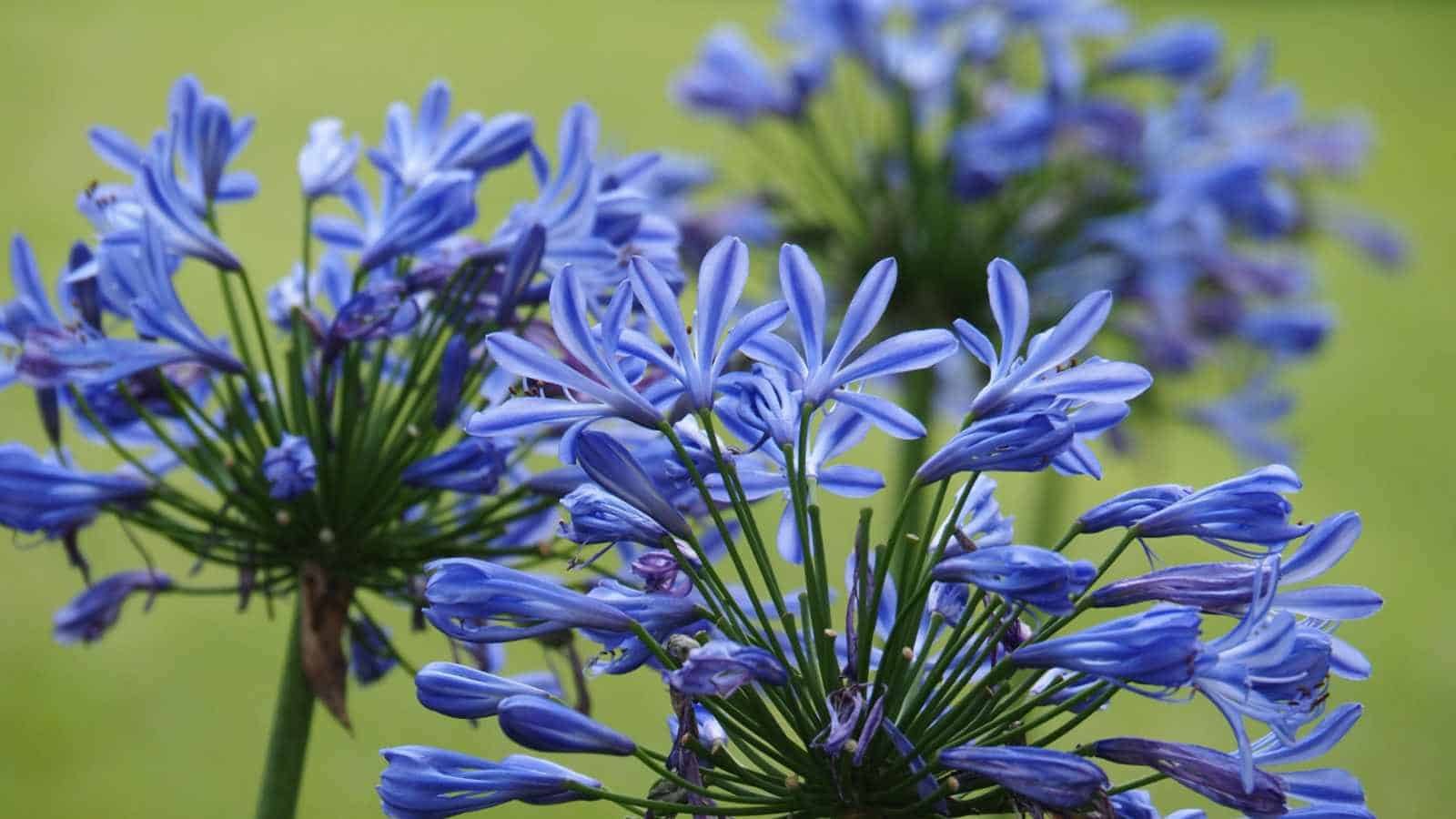
- Botanical Name: Agapanthus africanus
- Hardiness Zones: 6-10 (USDA)
- Plant Type: Perennial
- Sun Exposure: Full Sun to Partial Shade
Blue African Lilies produce globe-shaped clusters of blue flowers atop long, slender stems. They are drought-tolerant and thrive in containers or garden beds. Divide clumps for propagation.
-
Bluebell Vine (Sollya heterophylla)
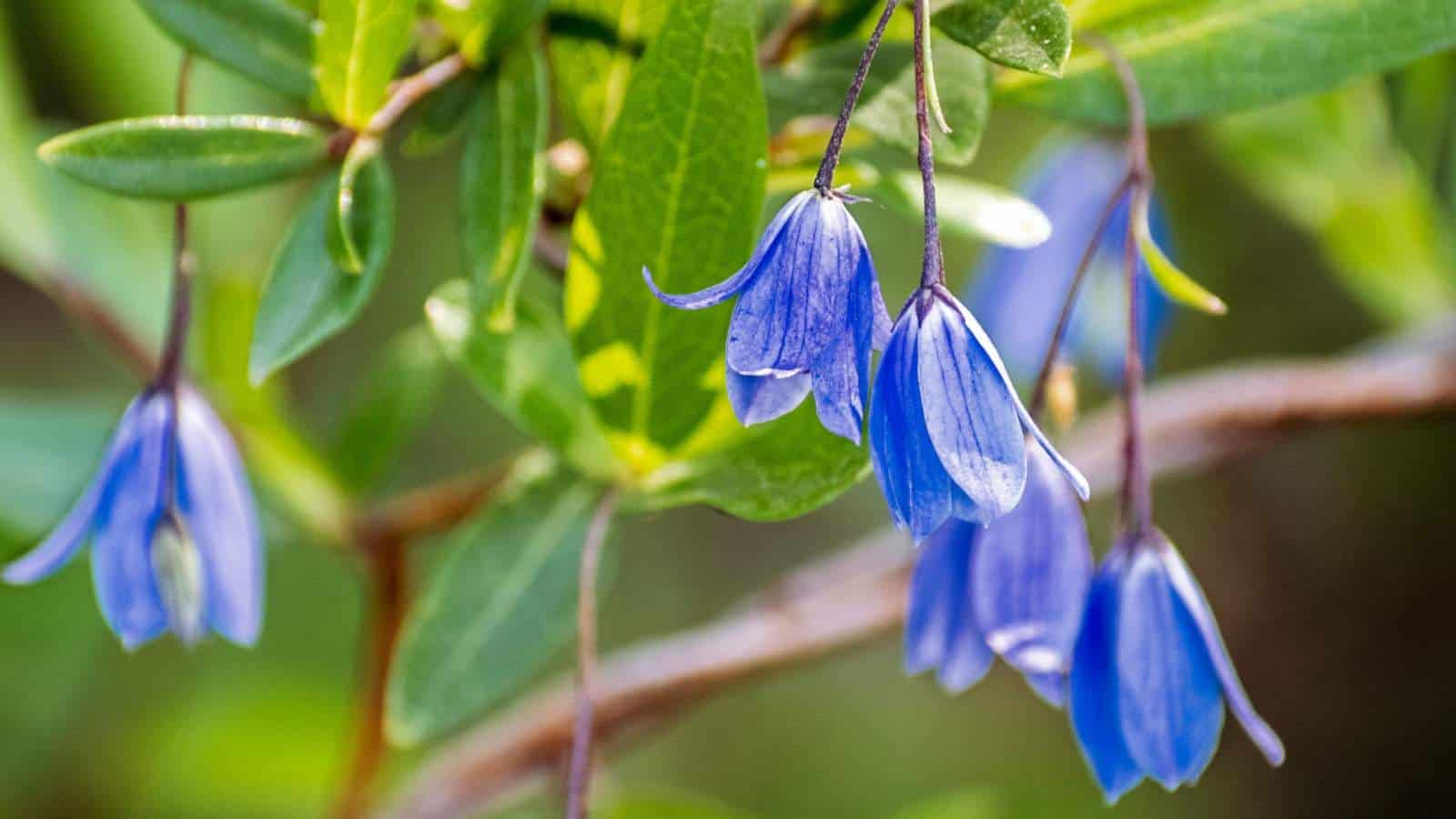
- Botanical Name: Sollya heterophylla
- Hardiness Zones: 9-11 (USDA)
- Plant Type: Vine
- Sun Exposure: Full Sun to Partial Shade
Bluebell Vines are evergreen climbers with star-shaped blue flowers. They require a sunny spot and well-drained soil. Prune lightly after flowering to maintain shape.
-
Blue Flax (Linum perenne)
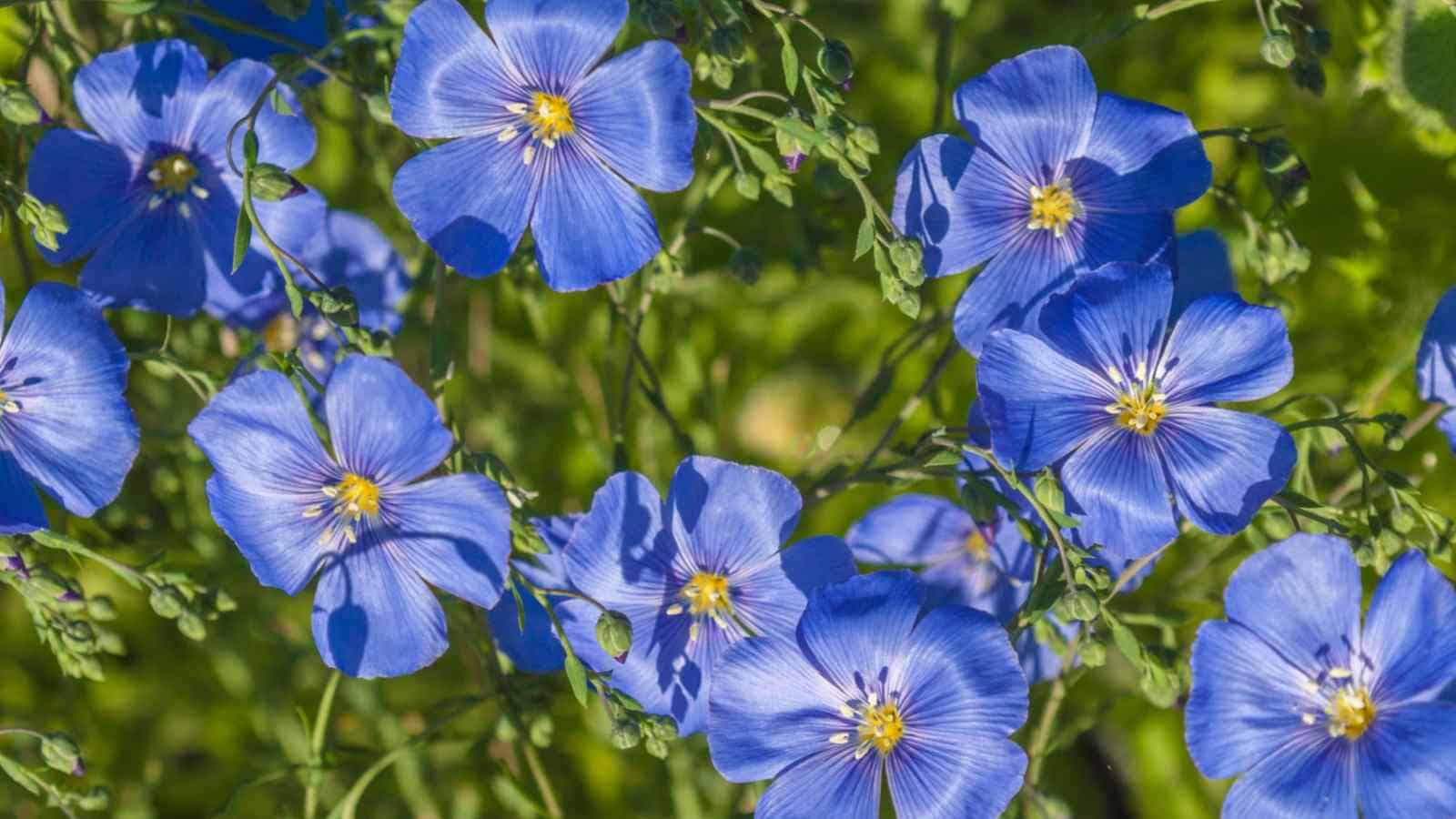
- Botanical Name: Linum perenne
- Hardiness Zones: 5-9 (USDA)
- Plant Type: Perennial
- Sun Exposure: Full Sun
Blue Flax bears delicate, sky-blue flowers on slender stems. It’s drought-tolerant and thrives in sandy or rocky soil. Deadhead regularly to encourage continuous blooming.
-
Blue Daisy Bush (Brachyglottis‘Sunshine’)
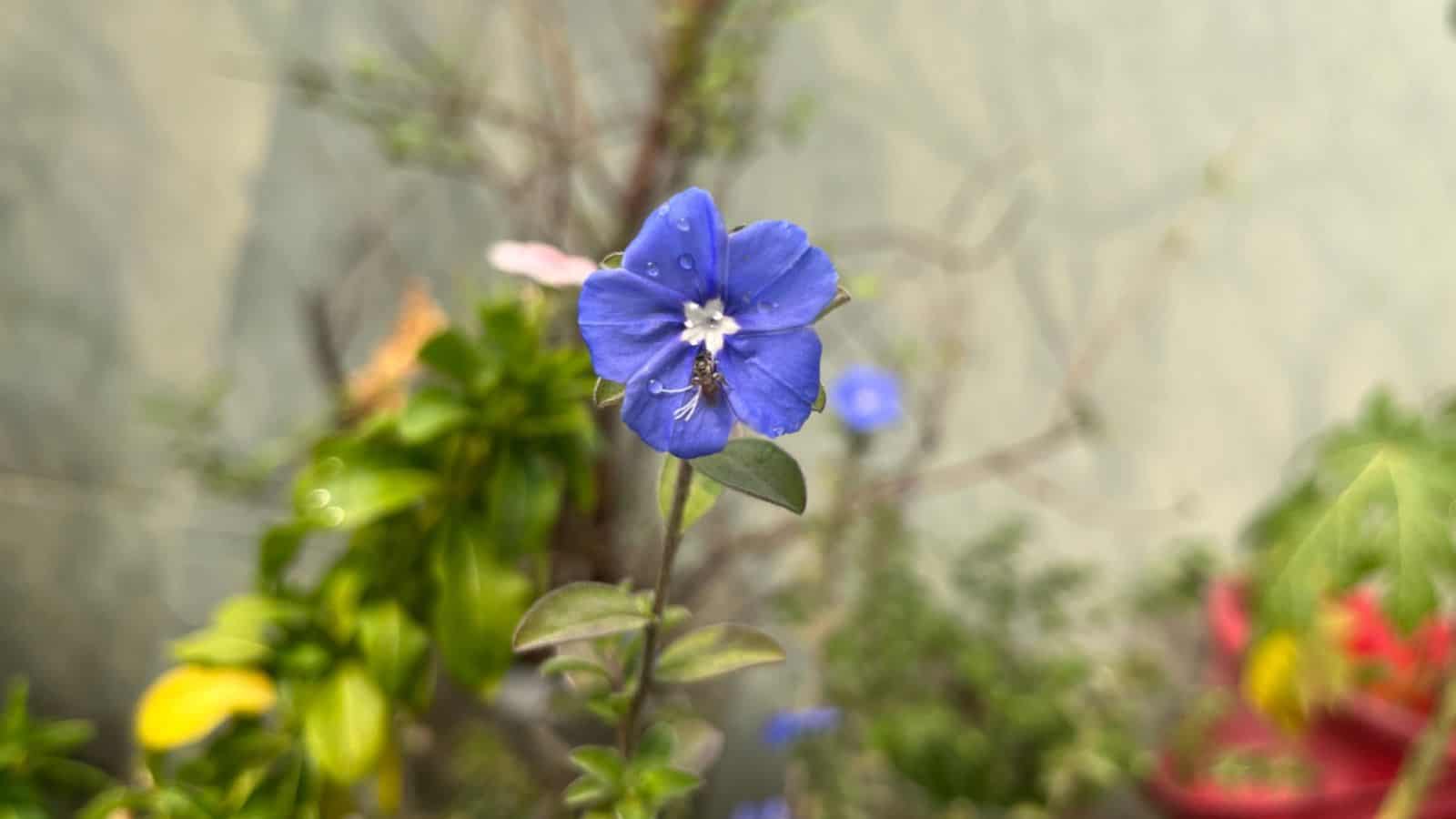
- Botanical Name: Brachyglottis ‘Sunshine’
- Hardiness Zones: 8-11 (USDA)
- Plant Type: Shrub
- Sun Exposure: Full Sun
Blue Daisy Bush is a compact shrub with silver-blue foliage and daisy-like blue flowers. It’s salt-tolerant and excellent for coastal gardens. Prune lightly to maintain shape.
-
Blue Leadwort (Ceratostigma plumbaginoides)

- Botanical Name: Ceratostigma plumbaginoides
- Hardiness Zones: 5-9 (USDA)
- Plant Type: Perennial
- Sun Exposure: Full Sun to Partial Shade
Blue Leadwort forms low mounds of green foliage that turn deep red in fall. Bright blue pigment flowers appear in late summer. It’s drought-tolerant once established and great for ground cover.
-
Blue Water Lily (Nymphaea caerulea)

- Botanical Name: Nymphaea caerulea
- Hardiness Zones: 9-11 (USDA)
- Plant Type: Aquatic Perennial
- Sun Exposure: Full Sun
Blue Water Lilies have large, floating blue flowers with a sweet fragrance. They thrive in still, sunny water and are a stunning addition to ponds or water features.
-
Blue Evening Primrose (Oenothera speciosa)

- Botanical Name: Oenothera speciosa
- Hardiness Zones: 5-10 (USDA)
- Plant Type: Perennial
- Sun Exposure: Full Sun
Blue Evening Primrose bears saucer-shaped, sky-blue flowers that open in the evening. It’s drought-tolerant and spreads readily, making it ideal for naturalizing in wildflower gardens.
-
Blue Lily (Agapanthus orientalis)
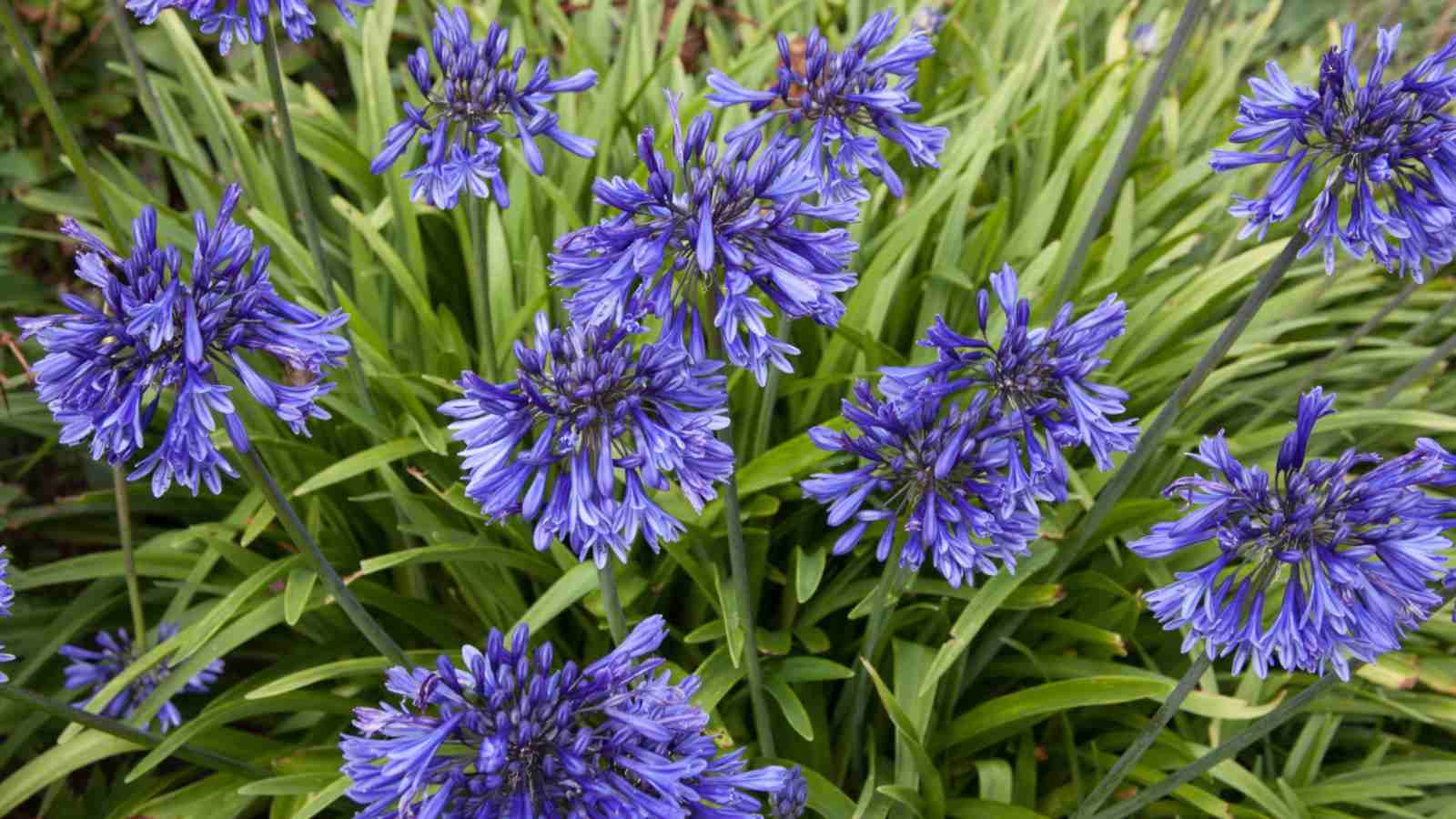
- Botanical Name: Agapanthus orientalis
- Hardiness Zones: 7-11 (USDA)
- Plant Type: Perennial
- Sun Exposure: Full Sun to Partial Shade
Blue Lilies showcase globular clusters of blue flowers on tall stalks. They are low-maintenance and thrive in containers or garden borders. Provide well-drained soil for optimal growth.
-
Blue Star Flower (Amsonia tabernaemontana)
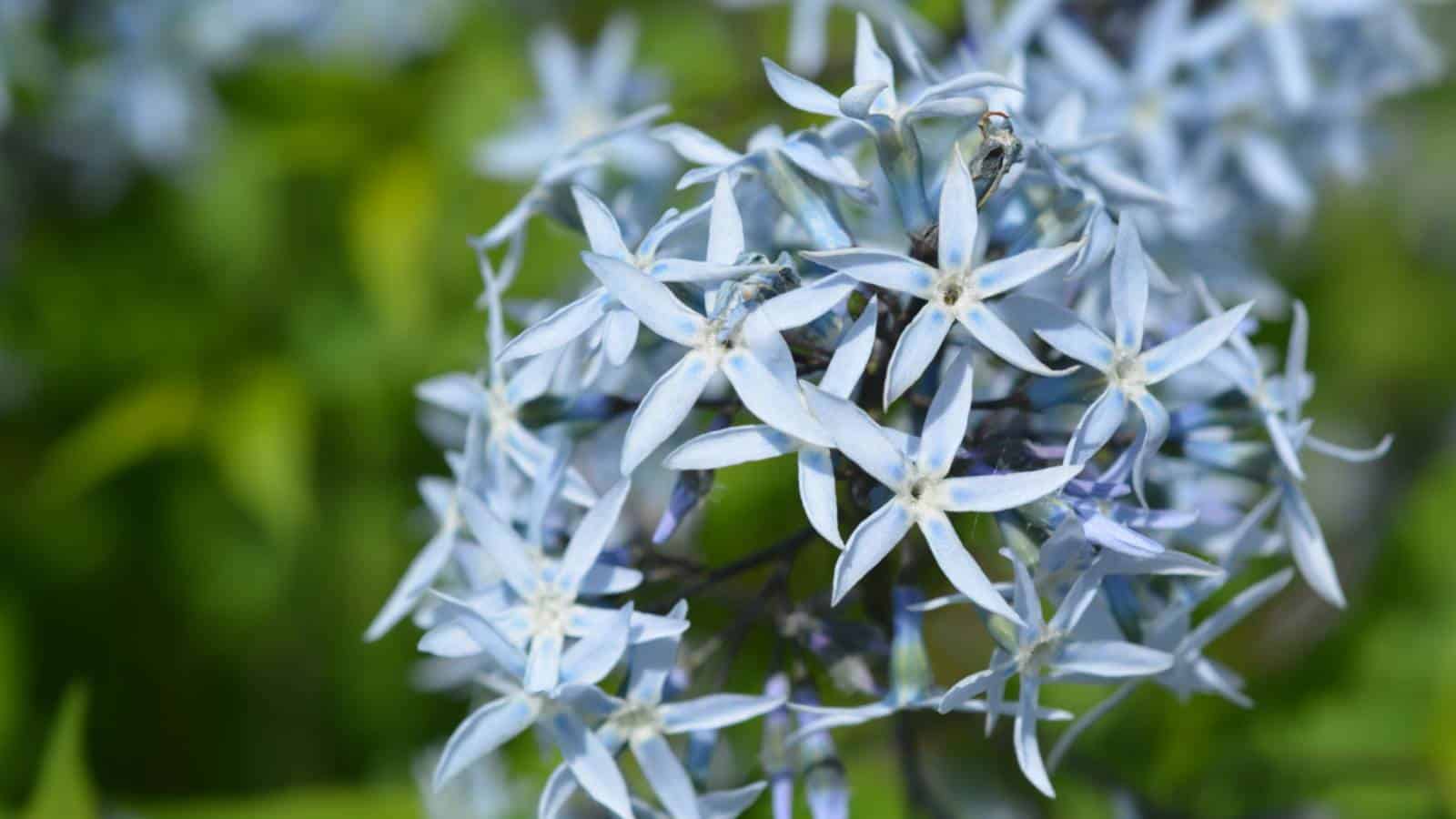
- Botanical Name: Amsonia tabernaemontana
- Hardiness Zones: 3-9 (USDA)
- Plant Type: Perennial
- Sun Exposure: Full Sun to Partial Shade
Blue Star Flowers, known as blue ice bluestar, feature star-shaped blue blooms and slender leaves. They are deer-resistant and attract butterflies. They thrive in moist, well-drained soil.
-
Blue Throatwort (Trachelium caeruleum)

- Botanical Name: Trachelium caeruleum
- Hardiness Zones: 5-9 (USDA)
- Plant Type: Perennial
- Sun Exposure: Full Sun to Partial Shade
Blue Throatwort bears small, clustered blue flowers on sturdy stems. It’s excellent for cutting and lasts well in bouquets. It prefers rich, moist soil.
-
Blue Vervain (Verbena hastata)

- Botanical Name: Verbena hastata
- Hardiness Zones: 3-9 (USDA)
- Plant Type: Perennial
- Sun Exposure: Full Sun to Partial Shade
Blue Vervain has spiky blue flowers and lance-shaped leaves. It’s a favorite of pollinators and thrives in damp soil. It’s a natural choice for rain gardens.
-
Blue Wild Indigo (Baptisia australis)

- Botanical Name: Baptisia australis
- Hardiness Zones: 3-9 (USDA)
- Plant Type: Perennial
- Sun Exposure: Full Sun
Blue Wild Indigo, also known as Blue False Indigo, boasts tall spikes of blue pea-like flowers and blue-green foliage. It’s drought-tolerant and adds a unique architectural element to gardens.
-
Blue Fan Flower (Scaevola aemula)
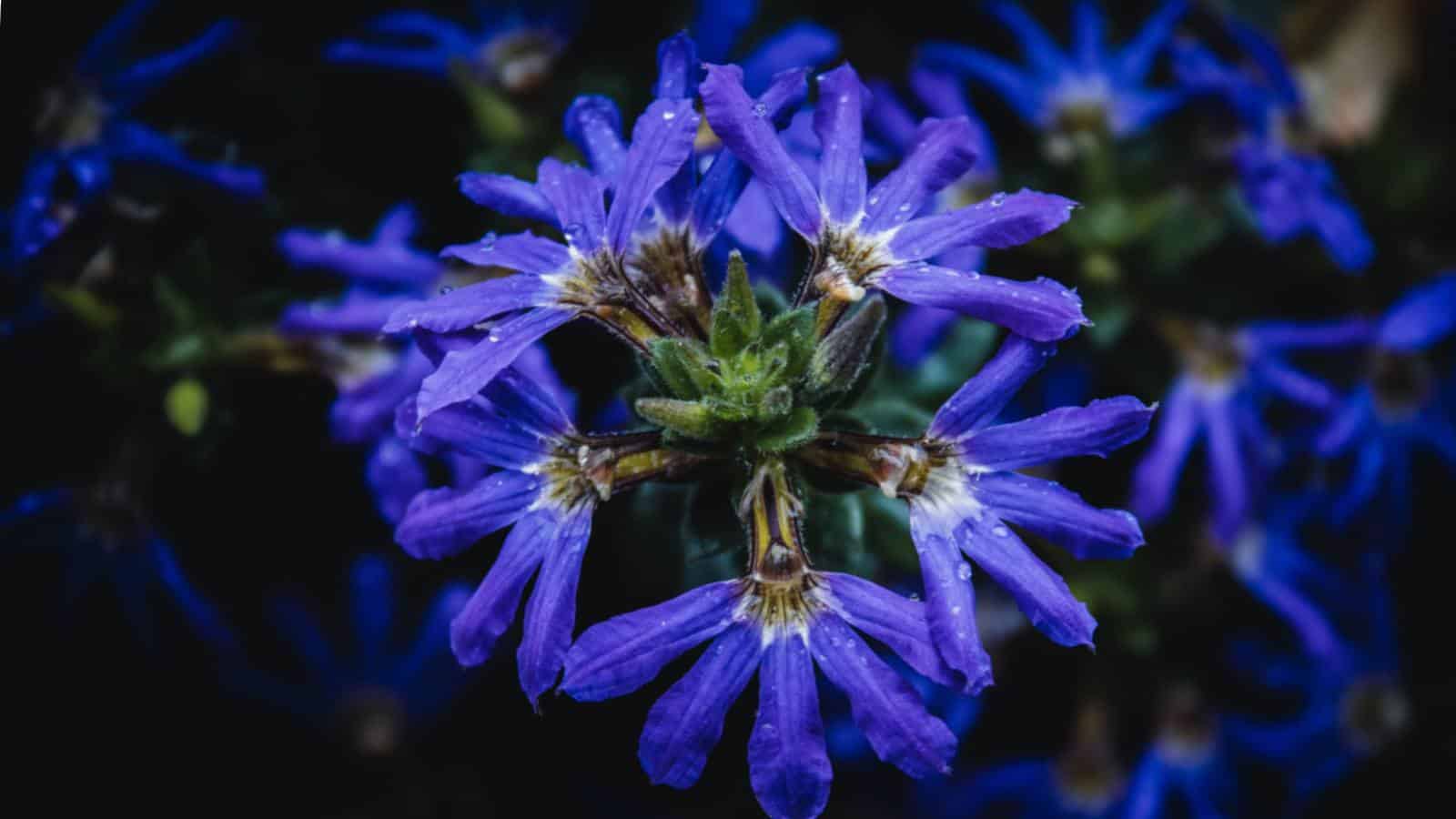
- Botanical Name: Scaevola aemula
- Hardiness Zones: 9-11 (USDA)
- Plant Type: Annual or Perennial (depending on region)
- Sun Exposure: Full Sun to Partial Shade
Blue Fan Flower has fan-shaped blue petals and a trailing habit, making it ideal for hanging baskets and containers. It blooms profusely throughout the season.
-
Blue Woodruff (Asperula orientalis)

- Botanical Name: Asperula orientalis
- Hardiness Zones: 5-9 (USDA)
- Plant Type: Perennial
- Sun Exposure: Partial Shade
Blue Woodruff produces tiny, fragrant blue flowers and forms a dense ground cover. It’s perfect for shaded areas and well-drained soil. The flowers are often used in herbal teas.
-
Blue My Mind® Evolvulus (Evolvulus glomeratus)

- Botanical Name: Evolvulus glomeratus
- Hardiness Zones: 9-11 (USDA)
- Plant Type: Perennial
- Sun Exposure: Full Sun
Blue My Mind® Evolvulus is a low-growing plant with sky-blue flowers and silver-green foliage. It’s heat-tolerant and forms a beautiful carpet of blue in sunny gardens.
-
Blue Devil (Eryngium planum)
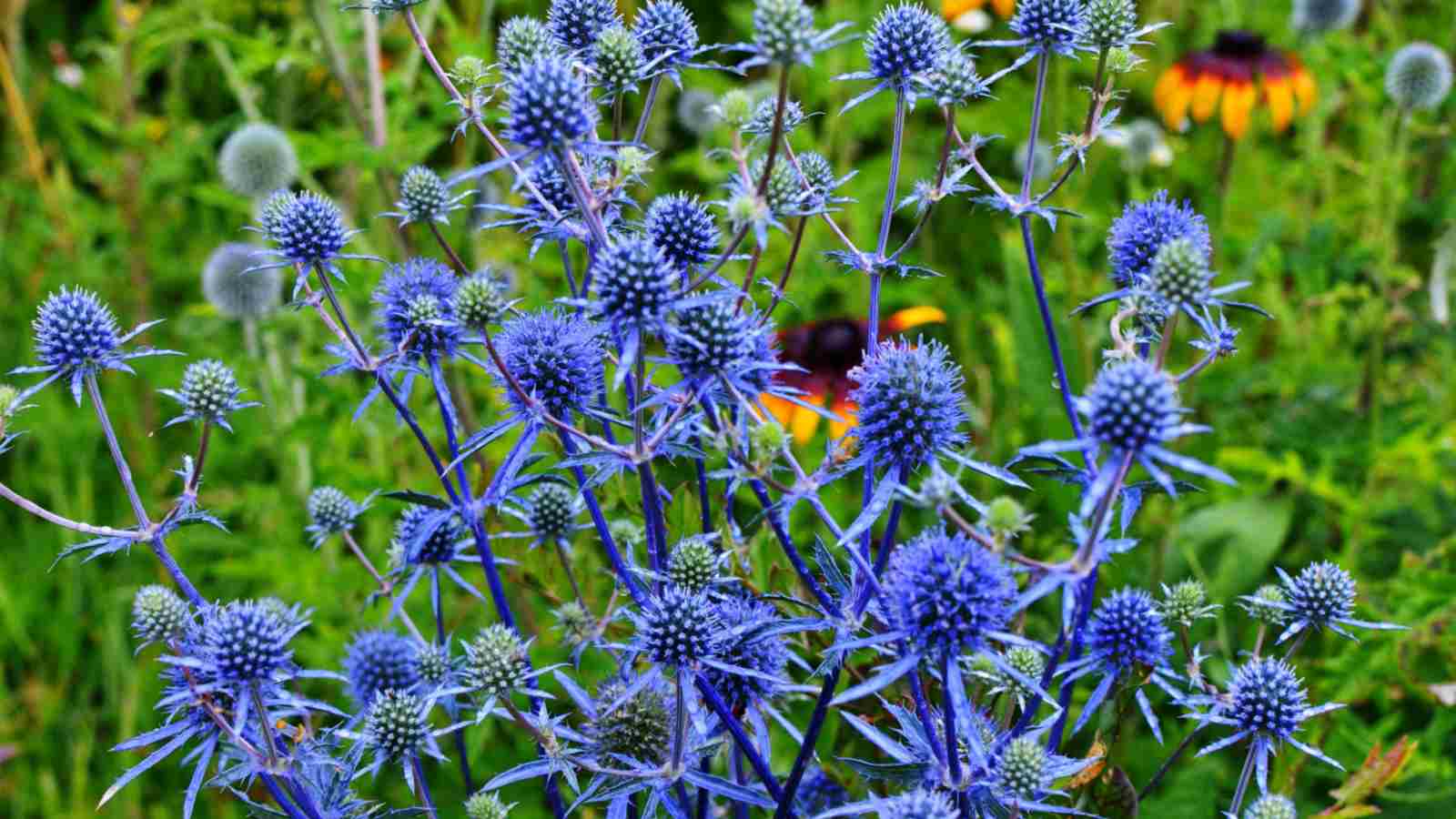
- Botanical Name: Eryngium planum
- Hardiness Zones: 3-9 (USDA)
- Plant Type: Perennial
- Sun Exposure: Full Sun
Blue Devil, also known as Sea Holly, features spiky blue flowers and thistle-like foliage. It’s a drought-tolerant plant that adds texture and interest to gardens and floral arrangements.
-
Blue-Eyed Grass (Sisyrinchium angustifolium)
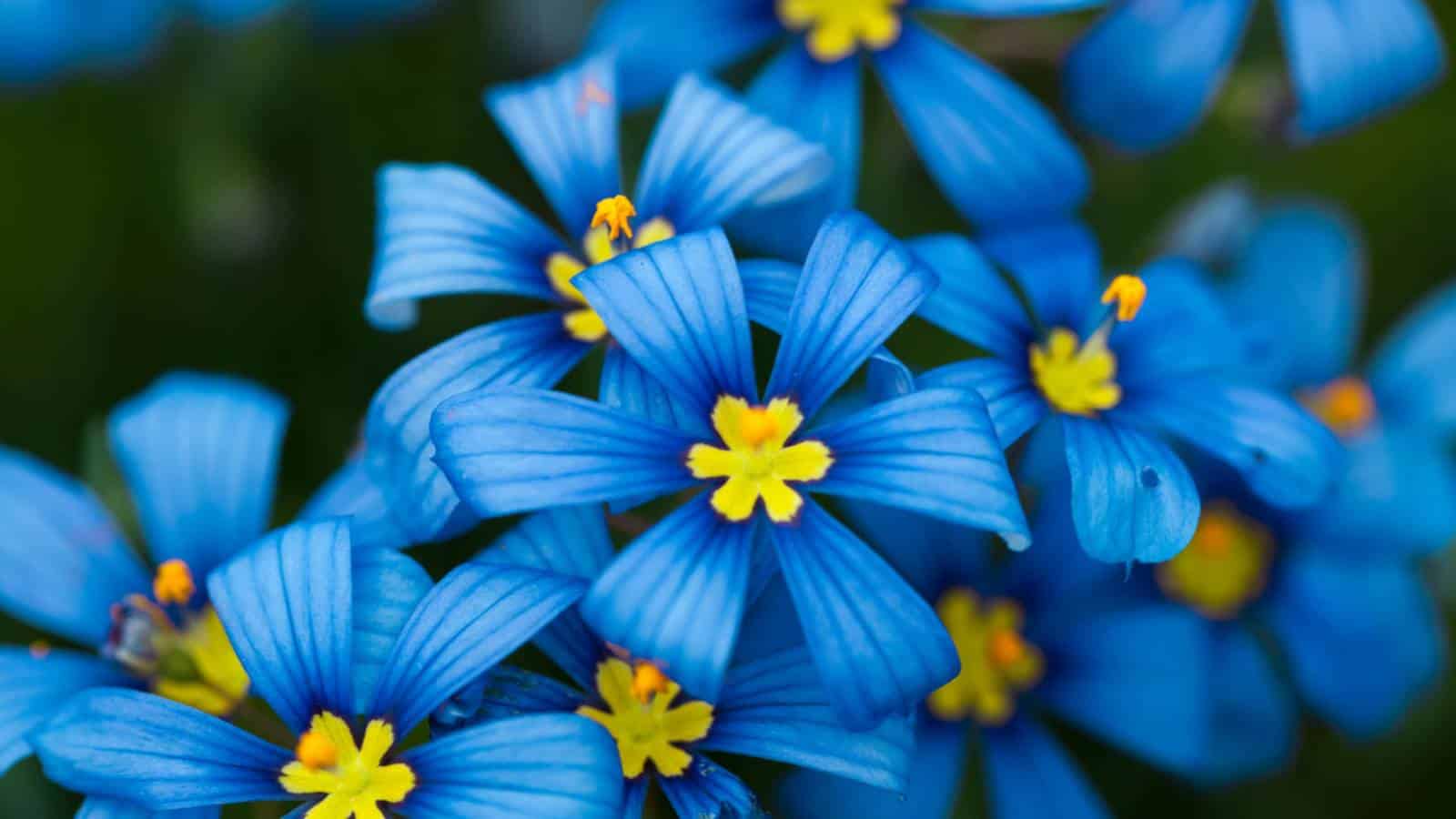
- Botanical Name: Sisyrinchium angustifolium
- Hardiness Zones: 4-9 (USDA)
- Plant Type: Perennial
- Sun Exposure: Full Sun to Partial Shade
Blue-Eyed Grass has slender, iris-like leaves and blue, star-shaped flowers. Despite its name, it’s not a true grass. It’s excellent for edging and naturalizing in gardens.
-
Blue Thimble Flower (Gilia capitata)

- Botanical Name: Gilia capitata
- Hardiness Zones: 3-9 (USDA)
- Plant Type: Annual
- Sun Exposure: Full Sun
Blue Thimble Flower, also called Globe Gilia, produces spherical clusters of blue flowers resembling thimbles. It’s drought-tolerant and thrives in well-drained soil. Perfect for wildflower gardens.
-
Blue Daisy Bush (Cineraria maritima)

- Botanical Name: Cineraria maritima
- Hardiness Zones: 9-11 (USDA)
- Plant Type: Perennial
- Sun Exposure: Full Sun to Partial Shade
Blue Daisy Bush has silvery-blue foliage and small, daisy-like blue flowers. It’s excellent for borders and rock gardens. Prune to maintain a compact shape.
-
Blue Corydalis (Corydalis flexuosa)

- Botanical Name: Corydalis flexuosa
- Hardiness Zones: 5-8 (USDA)
- Plant Type: Perennial
- Sun Exposure: Full Sun to Partial Shade
Blue Corydalis bears clusters of tubular, sky-blue flowers. It prefers cool, moist conditions and partial shade. It’s a delightful addition to woodland gardens.
-
Blue Leadwort (Plumbago auriculata)
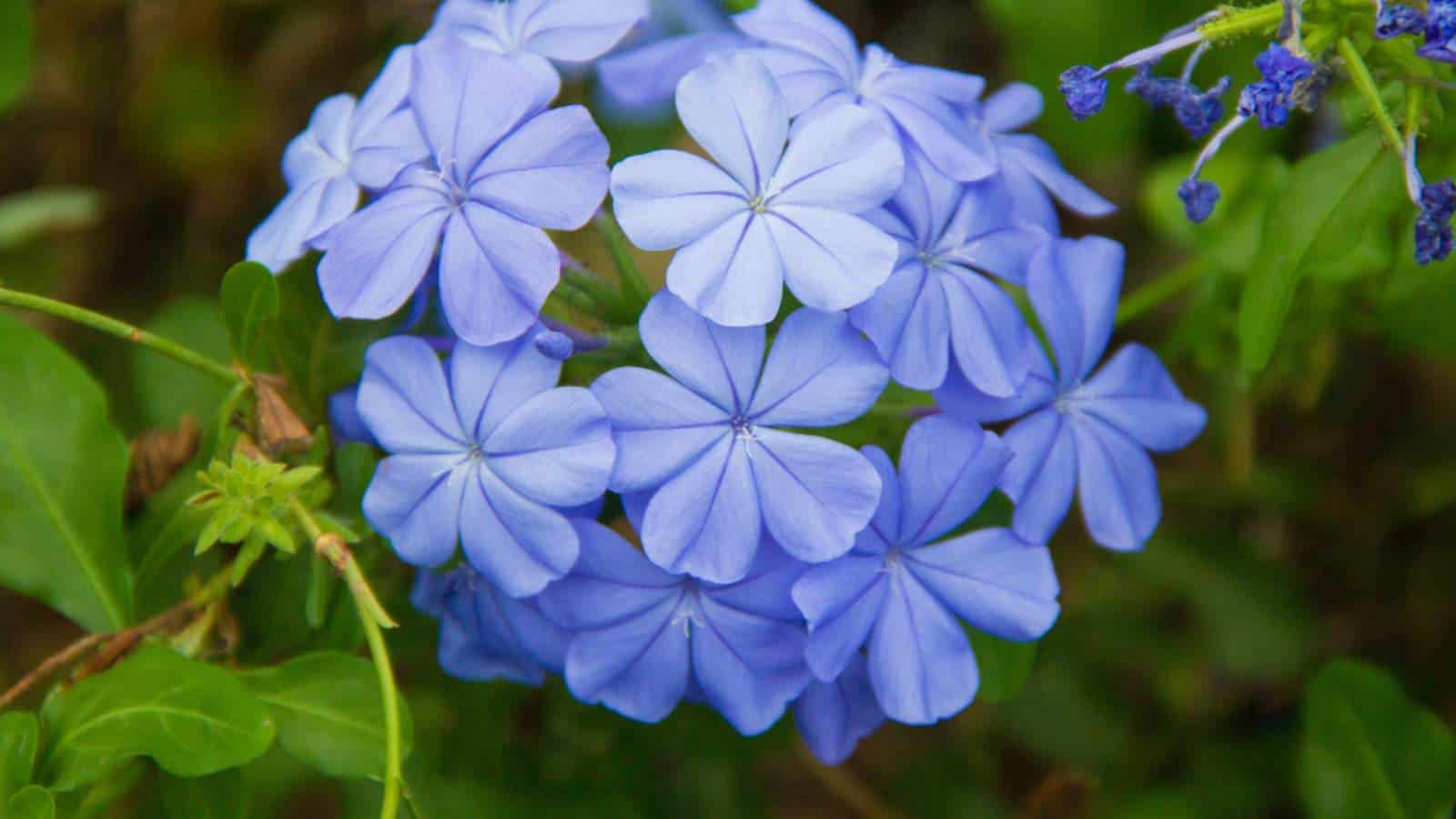
- Botanical Name: Plumbago auriculata
- Hardiness Zones: 9-11 (USDA)
- Plant Type: Shrub
- Sun Exposure: Full Sun
Blue Leadwort is a sprawling shrub with clusters of sky-blue flowers. It’s drought-tolerant and attracts butterflies. Prune to maintain shape and encourage bushier growth.
-
Blue Jacaranda (Jacaranda mimosifolia)
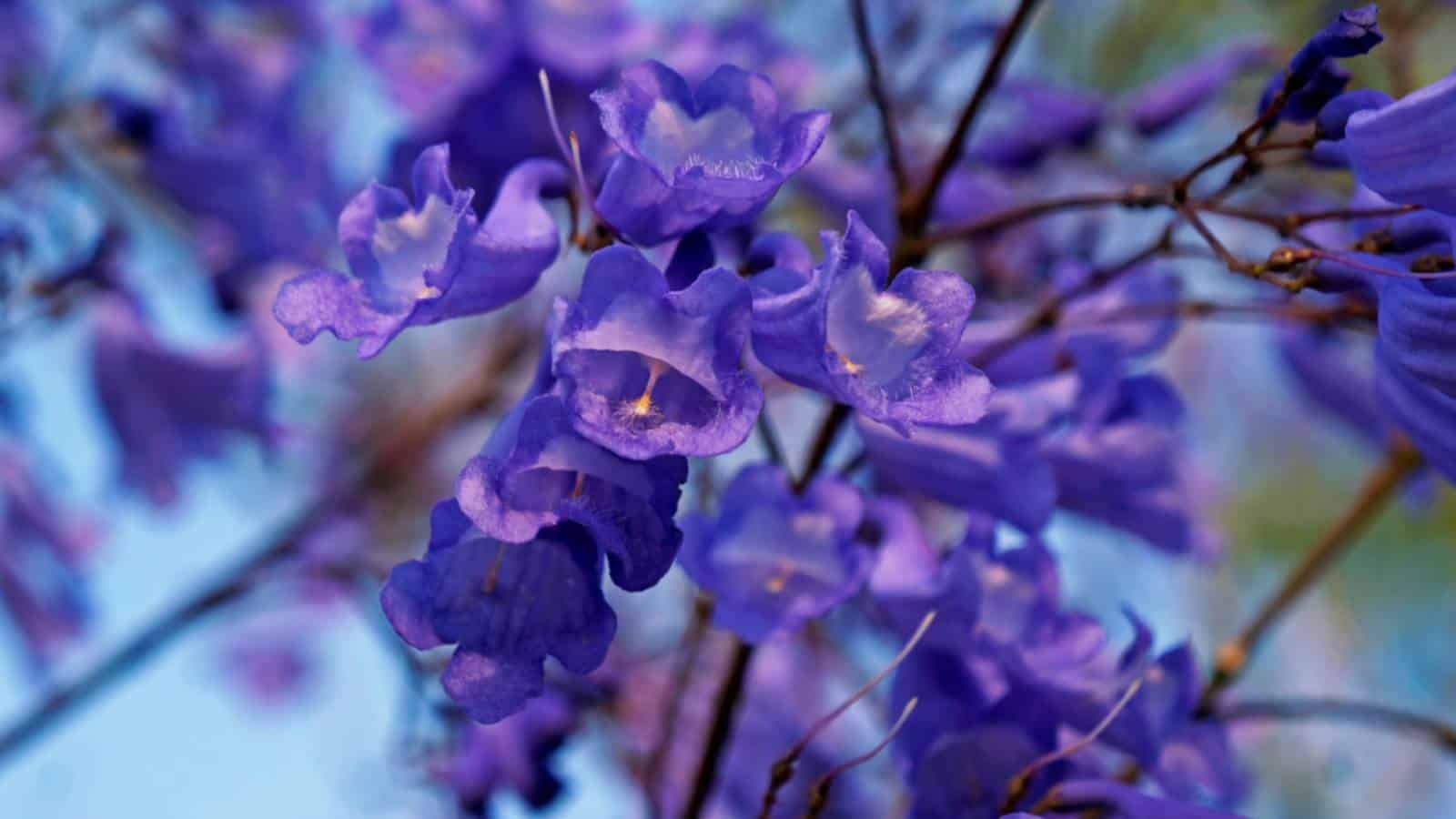
- Botanical Name: Jacaranda mimosifolia
- Hardiness Zones: 10-11 (USDA)
- Plant Type: Tree
- Sun Exposure: Full Sun
Blue Jacaranda is a stunning tree with fern-like leaves and abundant clusters of lavender-blue flowers. It adds a tropical touch to landscapes and thrives in warm climates.
-
Blue Gilia (Gilia achilleifolia)
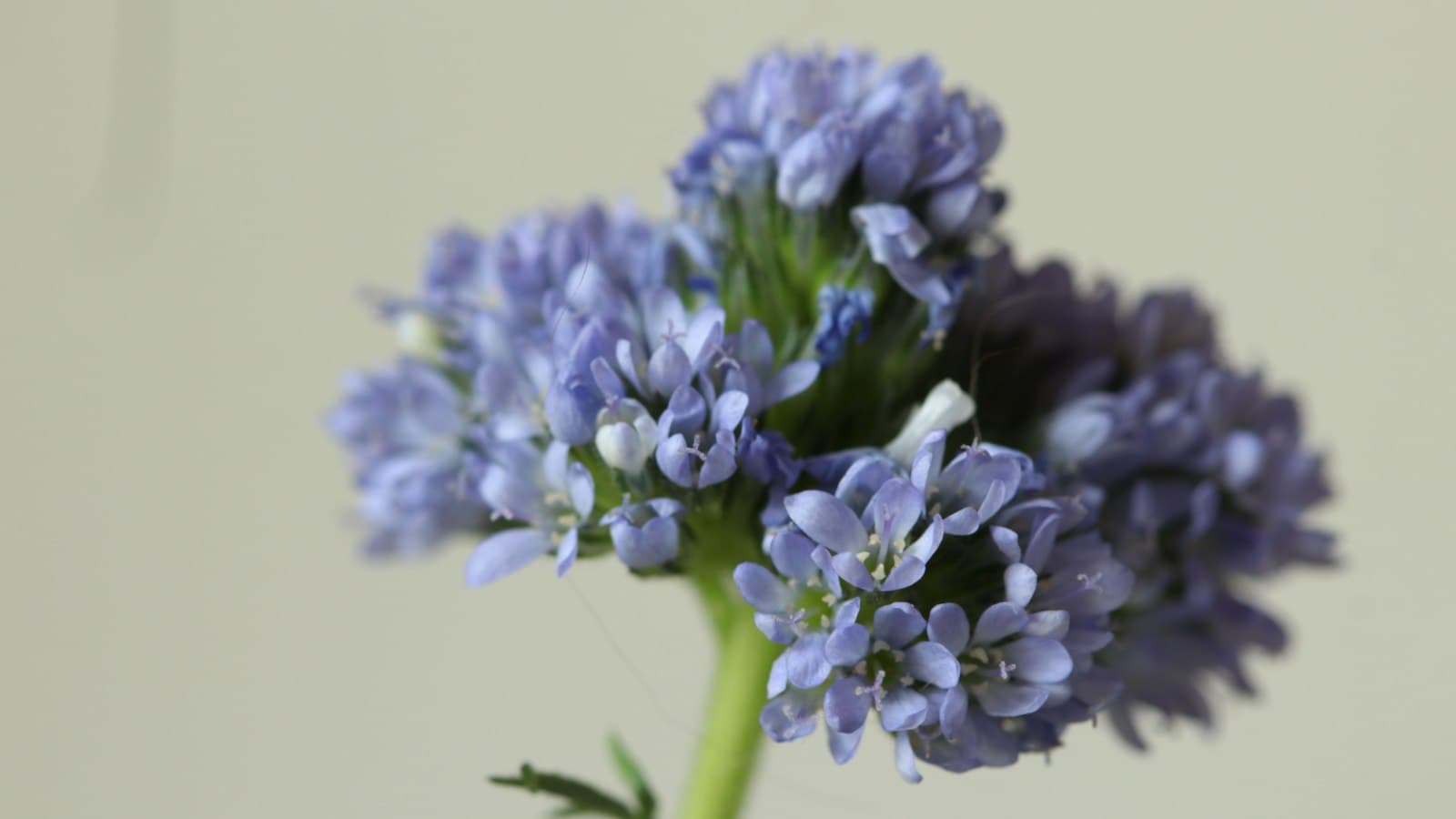
- Botanical Name: Gilia achilleifolia
- Hardiness Zones: 3-10 (USDA)
- Plant Type: Annual
- Sun Exposure: Full Sun
Blue Gilia produces delicate, azure-blue flowers on slender stems. It’s easy to grow from seeds and attracts pollinators. It’s a charming addition to meadows and cottage gardens.
-
Blue Fan Sage (Salvia patens)

- Botanical Name: Salvia patens
- Hardiness Zones: 8-11 (USDA)
- Plant Type: Perennial
- Sun Exposure: Full Sun
Blue Fan Sage has velvety, deep blue flowers and aromatic foliage. It’s drought-tolerant and attracts hummingbirds and bees. Prune after flowering to encourage bushy growth.
-
Blue Coneflower (Echinacea purpurea)

- Botanical Name: Echinacea purpurea
- Hardiness Zones: 3-8 (USDA)
- Plant Type: Perennial
- Sun Exposure: Full Sun
Blue Coneflower has purple-blue petals and a central cone. It’s a favorite of butterflies and bees. It’s a medicinal plant known for its immune-boosting properties.
-
Blue Pea Vine (Clitoria ternatea)
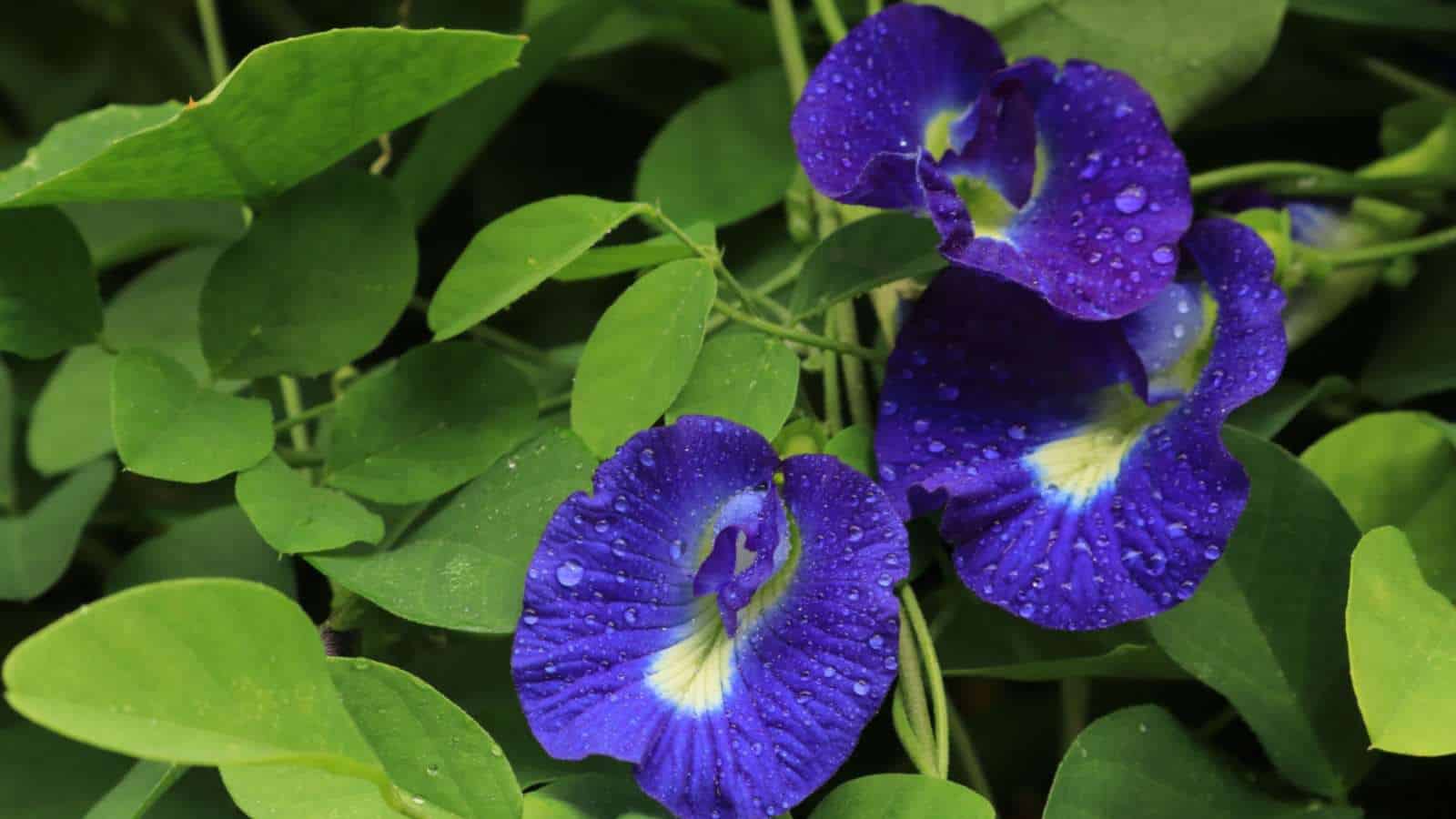
- Botanical Name: Clitoria ternatea
- Hardiness Zones: 9-11 (USDA)
- Plant Type: Vine
- Sun Exposure: Full Sun to Partial Shade
Blue Pea Vine has striking indigo-blue flowers and fern-like foliage. It’s used in traditional medicine and culinary dishes. It requires support for climbing.
-
Blue Mink (Ageratum houstonianum)
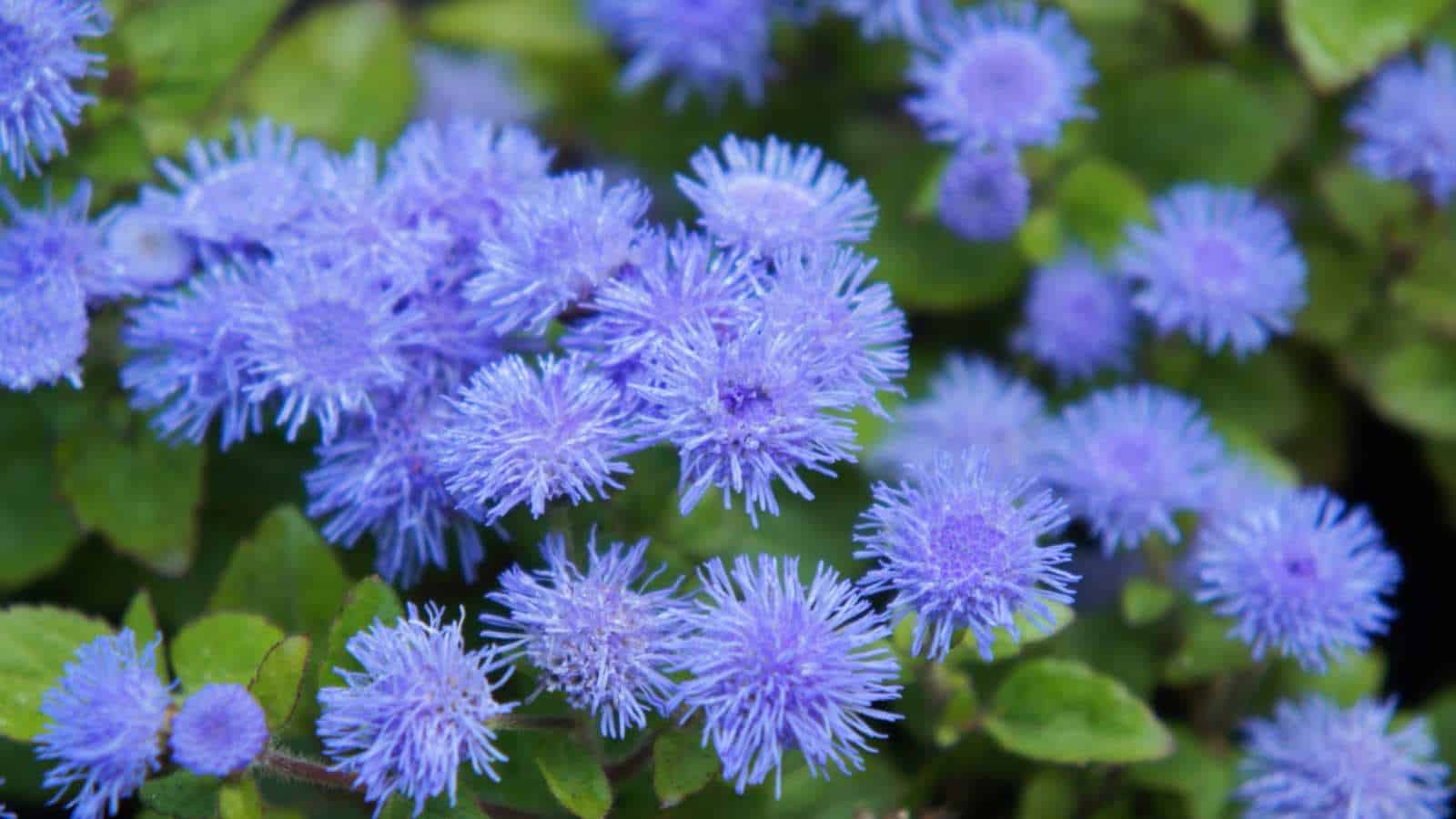
- Botanical Name: Ageratum houstonianum
- Hardiness Zones: 2-11 (USDA)
- Plant Type: Annual
- Sun Exposure: Full Sun to Partial Shade
Blue Mink, also known as Floss Flower, displays fluffy clusters of small, powder-blue flowers. It blooms profusely and is excellent for borders, containers, and mass plantings.
-
Blue Sage or Mealy Cup Sage (Salvia farinacea)

- Botanical Name: Salvia farinacea
- Hardiness Zones: 8-10 (USDA)
- Plant Type: Perennial
- Sun Exposure: Full Sun
Blue Sage, or Mealy Cup Sage, features spiky blue flowers on upright stems. It’s a magnet for bees and butterflies and is perfect for dry, sunny gardens.
-
Blue Thistle (Echinops ritro)

- Botanical Name: Echinops ritro
- Hardiness Zones: 3-9 (USDA)
- Plant Type: Perennial
- Sun Exposure: Full Sun
Blue Thistle has spherical, steel-blue flowers surrounded by spiky bracts. It’s a favorite in dried flower arrangements and adds a touch of wild beauty to gardens.
-
Blue Cone Ginger (Costus woodsonii)
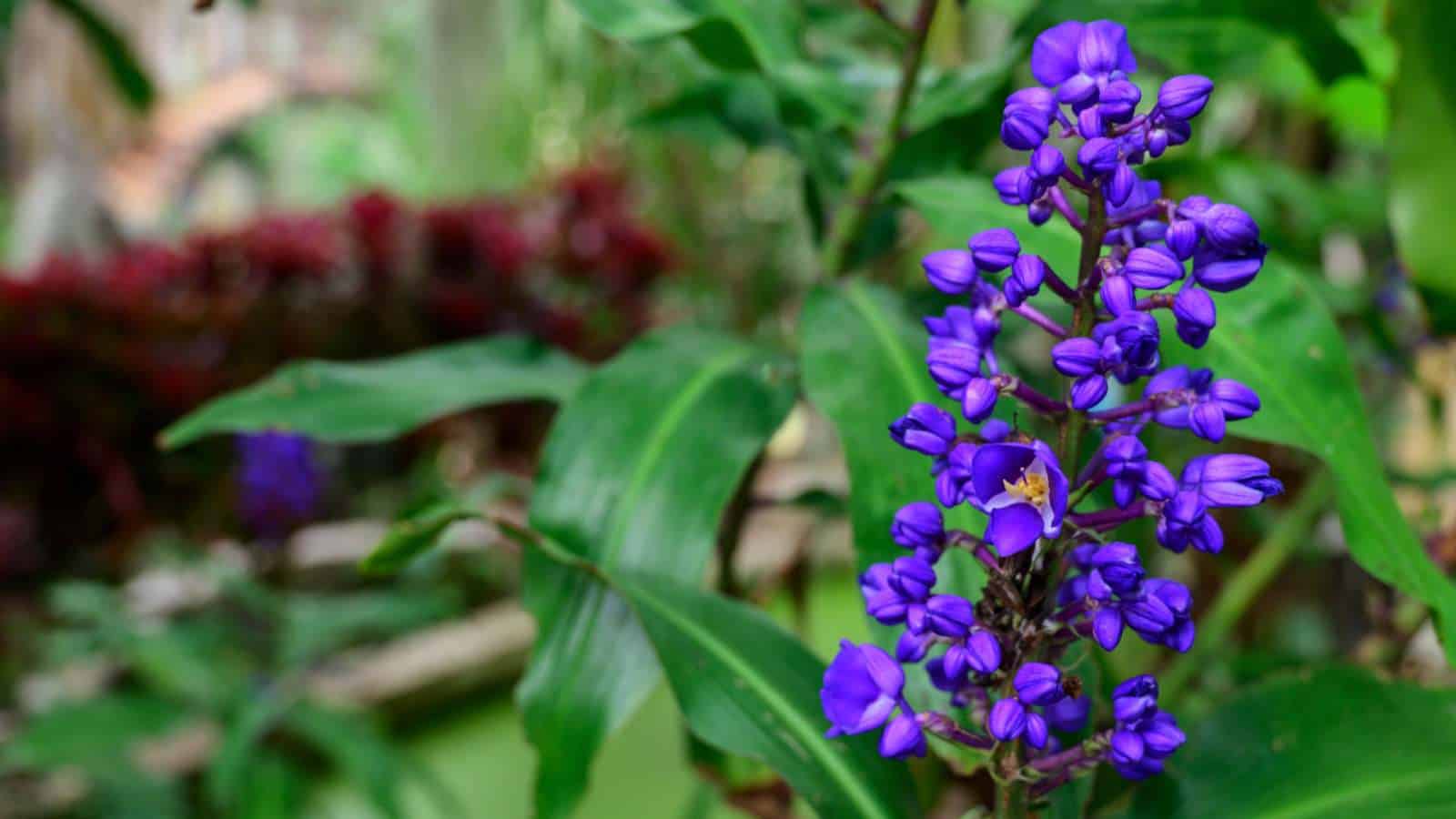
- Botanical Name: Costus woodsonii
- Hardiness Zones: 10-12 (USDA)
- Plant Type: Tropical Perennial
- Sun Exposure: Partial Shade to Full Shade
Blue Cone Ginger showcases blue, cone-shaped bracts with white flowers peeking out. It’s a tropical plant that adds an exotic flair to shaded gardens.
-
Blue Plumbago (Plumbago auriculata)

- Botanical Name: Plumbago auriculata
- Hardiness Zones: 9-11 (USDA)
- Plant Type: Shrub
- Sun Exposure: Full Sun to Partial Shade
Blue Plumbago is a sprawling shrub with clusters of sky-blue flowers. It’s drought-tolerant and attracts butterflies. Prune to maintain shape and encourage bushier growth.
-
Blue Daisy (Felicia amelloides)

- Botanical Name: Felicia amelloides
- Hardiness Zones: 8-11 (USDA)
- Plant Type: Perennial
- Sun Exposure: Full Sun to Partial Shade
Blue Daisies have bright blue petals surrounding a yellow center. They are drought-tolerant and attract bees and butterflies. They make charming additions to rock gardens.
-
Blue Flax Lily (Dianella tasmanica)

- Botanical Name: Dianella tasmanica
- Hardiness Zones: 7-11 (USDA)
- Plant Type: Perennial
- Sun Exposure: Full Sun to Partial Shade
Blue Flax Lily features slender blue-green leaves and small, star-shaped blue flowers. It’s a versatile plant, ideal for borders, mass plantings, or ground cover.
-
Blue Star Creeper (Isotoma fluviatilis)
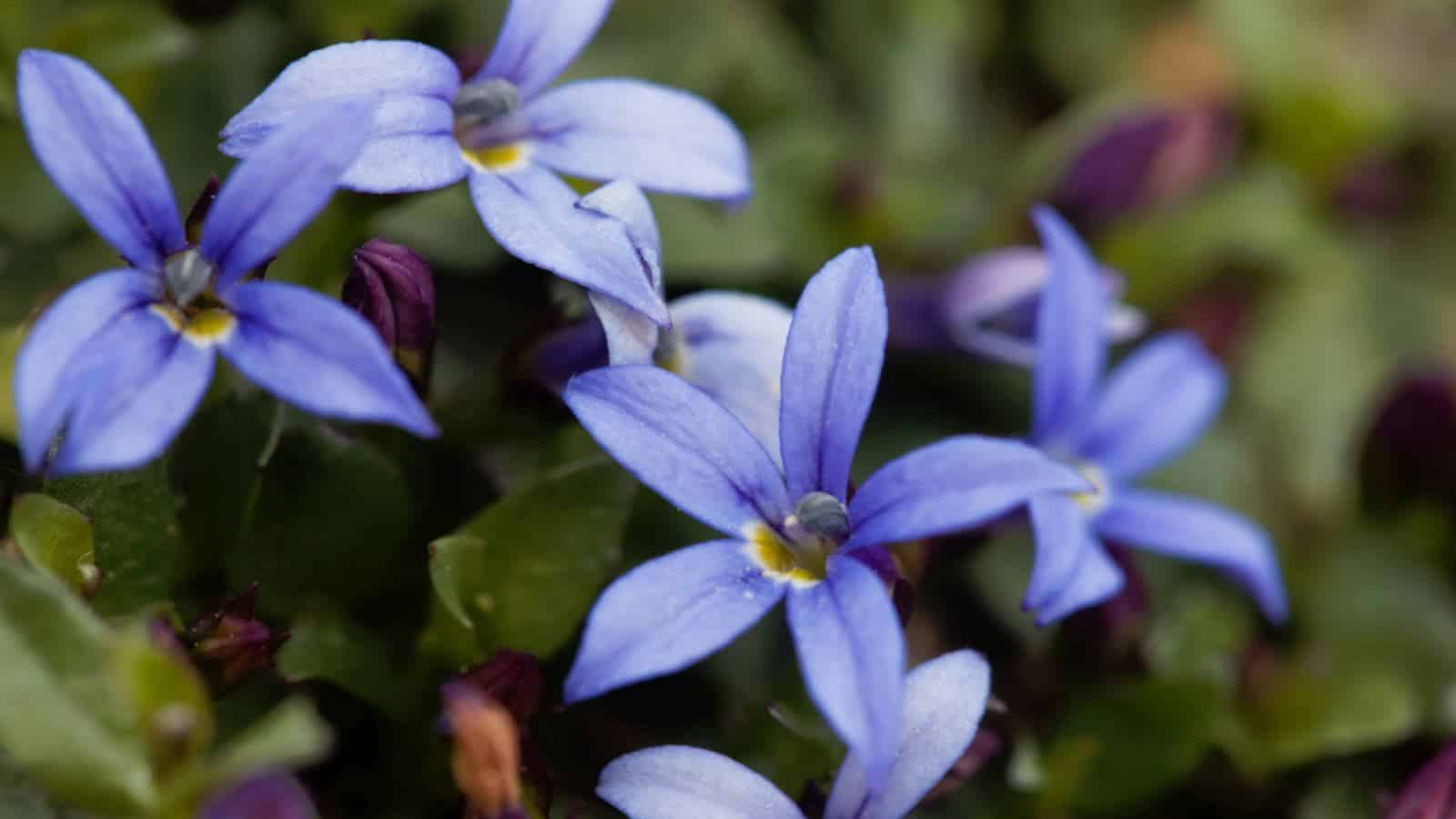
- Botanical Name: Isotoma fluviatilis
- Hardiness Zones: 5-9 (USDA)
- Plant Type: Perennial
- Sun Exposure: Full Sun to Partial Shade
Blue Star Creeper forms a dense mat of tiny, blue flowers and bright green foliage. It’s excellent for filling gaps in pathways, between stepping stones, or cascading over walls.
-
Blue Bamboo (Dendrocalamus strictus)

- Botanical Name: Dendrocalamus strictus
- Hardiness Zones: 8-11 (USDA)
- Plant Type: Clumping Bamboo
- Sun Exposure: Full Sun to Partial Shade
Blue Bamboo has powdery blue culms and lush green foliage. It’s a fast-growing bamboo variety that adds a touch of elegance and privacy to gardens and landscapes.
-
Blue Dune Lyme Grass (Leymus arenarius)

- Botanical Name: Leymus arenarius
- Hardiness Zones: 3-9 (USDA)
- Plant Type: Perennial Grass
- Sun Exposure: Full Sun to Partial Shade
Blue Dune Lyme Grass has blue-green foliage that sways gracefully in the breeze. It’s salt-tolerant and thrives in coastal gardens. It also helps prevent soil erosion.
-
Blue Globe Thistle (Echinops bannaticus)
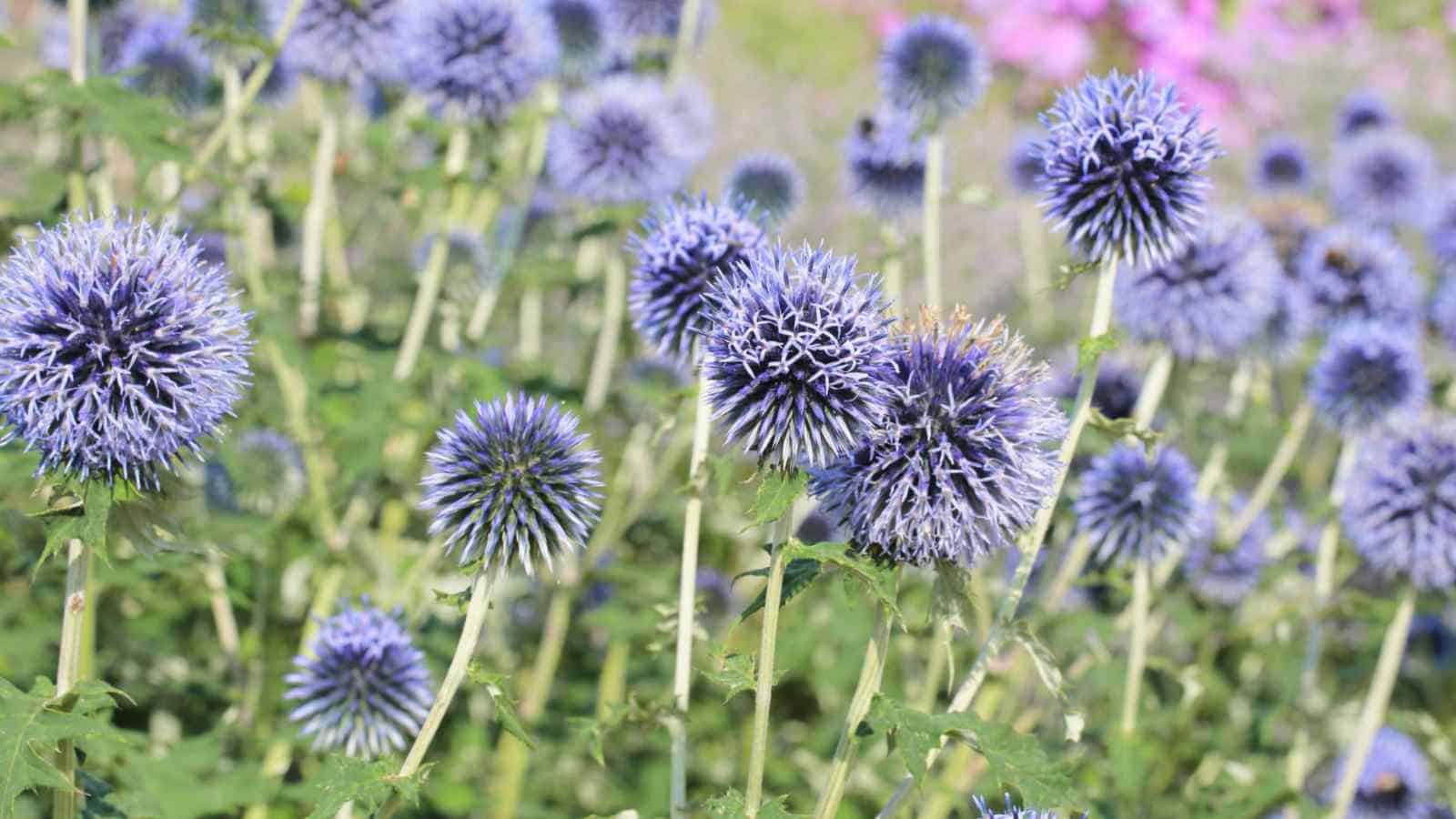
- Botanical Name: Echinops bannaticus
- Hardiness Zones: 3-8 (USDA)
- Plant Type: Perennial
- Sun Exposure: Full Sun
Blue Globe Thistle showcases striking steel-blue spherical blooms atop tall stems. This drought-tolerant and deer-resistant plant is excellent for cottage gardens, providing a touch of wild beauty.
-
Blue Porterweed (Stachytarpheta jamaicensis)
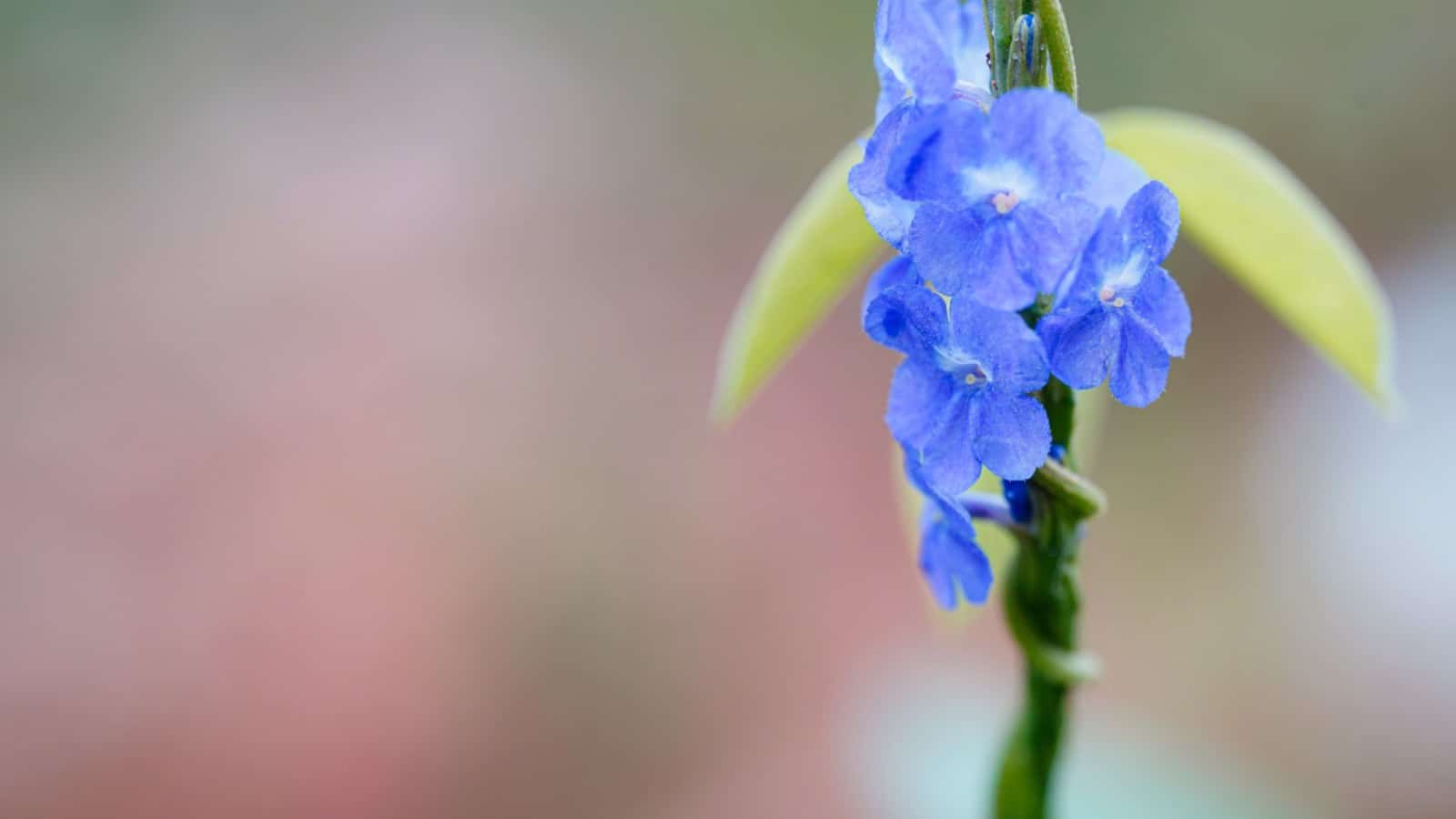
- Botanical Name: Stachytarpheta jamaicensis
- Hardiness Zones: 9-11 (USDA)
- Plant Type: Perennial
- Sun Exposure: Full Sun
Blue Porterweed features clusters of tiny blue flowers on slender spikes. Attractive to butterflies and bees, it adds a tropical allure to gardens. Low-maintenance, it thrives in sunny conditions.
-
Blue Pimpernel (Anagallis monelli)
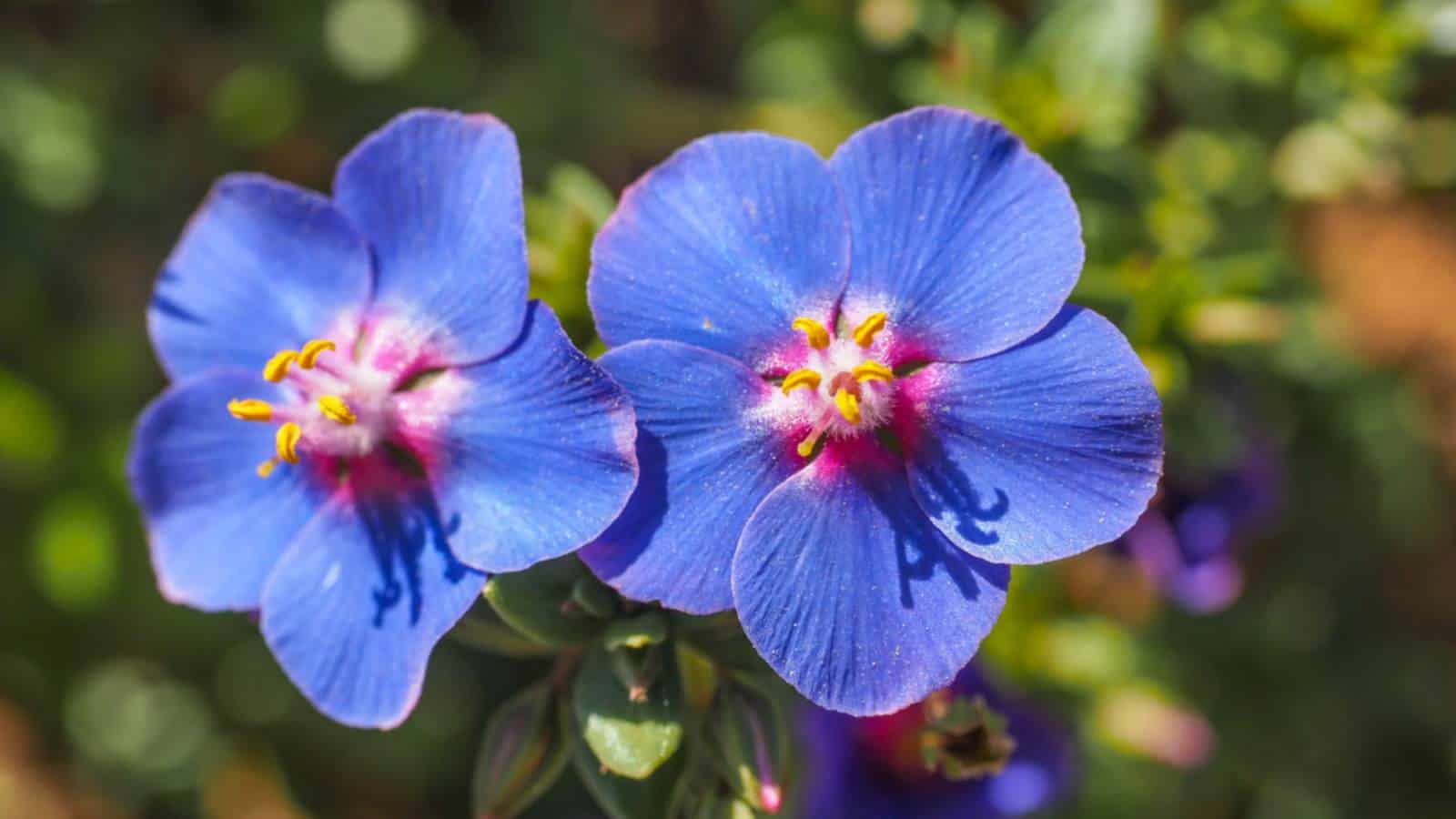
- Botanical Name: Anagallis monelli
- Hardiness Zones: 7-11 (USDA)
- Plant Type: Perennial
- Sun Exposure: Full Sun to Partial Shade
Blue Pimpernel displays delicate sky-blue flowers with a yellow center. Ideal for rock gardens and edging, it thrives in well-drained soil, blooming profusely in spring and summer.
-
Blue Rock Cress (Aubrieta deltoidea)

- Botanical Name: Aubrieta deltoidea
- Hardiness Zones: 4-7 (USDA)
- Plant Type: Perennial
- Sun Exposure: Full Sun
Blue Rock Cress forms a colorful ground cover with vivid blue flowers, cascading gracefully over walls and rocks. Perfect for alpine gardens and rocky landscapes, it adds charm and vibrancy.
-
Blue Hibiscus (Alyogyne huegelii)

- Botanical Name: Alyogyne huegelii
- Hardiness Zones: 9-11 (USDA)
- Plant Type: Shrub
- Sun Exposure: Full Sun
Blue Hibiscus features large blue to purple flowers with a prominent central stamen. Drought-tolerant and vibrant, it adds a tropical touch to gardens, enhancing their visual appeal.
-
Blue Dahlia (Dahlia spp.)
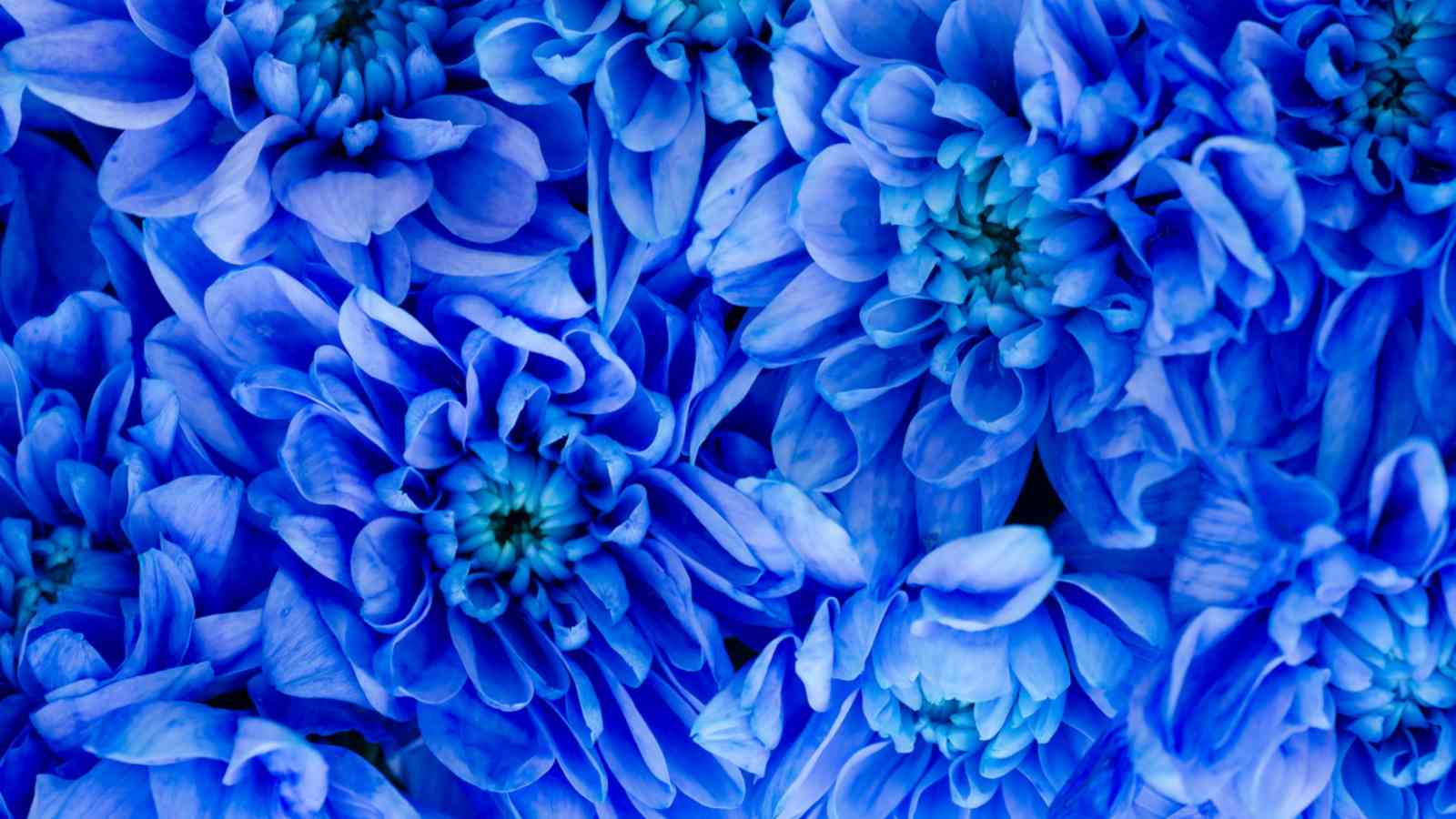
- Botanical Name: Dahlia spp.
- Hardiness Zones: 7-11 (USDA)
- Plant Type: Tuberous Perennial
- Sun Exposure: Full Sun
Blue Dahlias come in various shades, from powder blue to deep indigo, adding elegance to flower beds and bouquets. Tall varieties need support to prevent flopping, ensuring their beauty stands tall.
-
Blue Puya (Puya coerulea)

- Botanical Name: Puya coerulea
- Hardiness Zones: 8-11 (USDA)
- Plant Type: Perennial
- Sun Exposure: Full Sun to Partial Shade
Blue Puya showcases spiky blue-green leaves and tall flower spikes with bright blue blooms. Unique and exotic, it’s ideal for arid gardens and xeriscapes, providing a distinctive focal point.
-
Cornflower (Centaurea cyanus)

- Botanical Name: Centaurea cyanus
- Hardiness Zones: 2-11 (USDA)
- Plant Type: Annual
- Sun Exposure: Full Sun
Cornflowers, with their brilliant azure petals, add a touch of classic charm to gardens. They are easy to grow and attract bees and butterflies. Perfect for wildflower meadows and cottage gardens.
-
Grape Hyacinth (Muscari)

- Botanical Name: Muscari spp.
- Hardiness Zones: 3-9 (USDA)
- Plant Type: Bulbous Perennial
- Sun Exposure: Full Sun to Partial Shade
Grape Hyacinths feature compact spikes of small, cobalt-blue flowers resembling tiny grapes. They naturalize easily and make delightful additions to rock gardens and under deciduous trees.
-
Forget-Me-Nots (Myosotis)
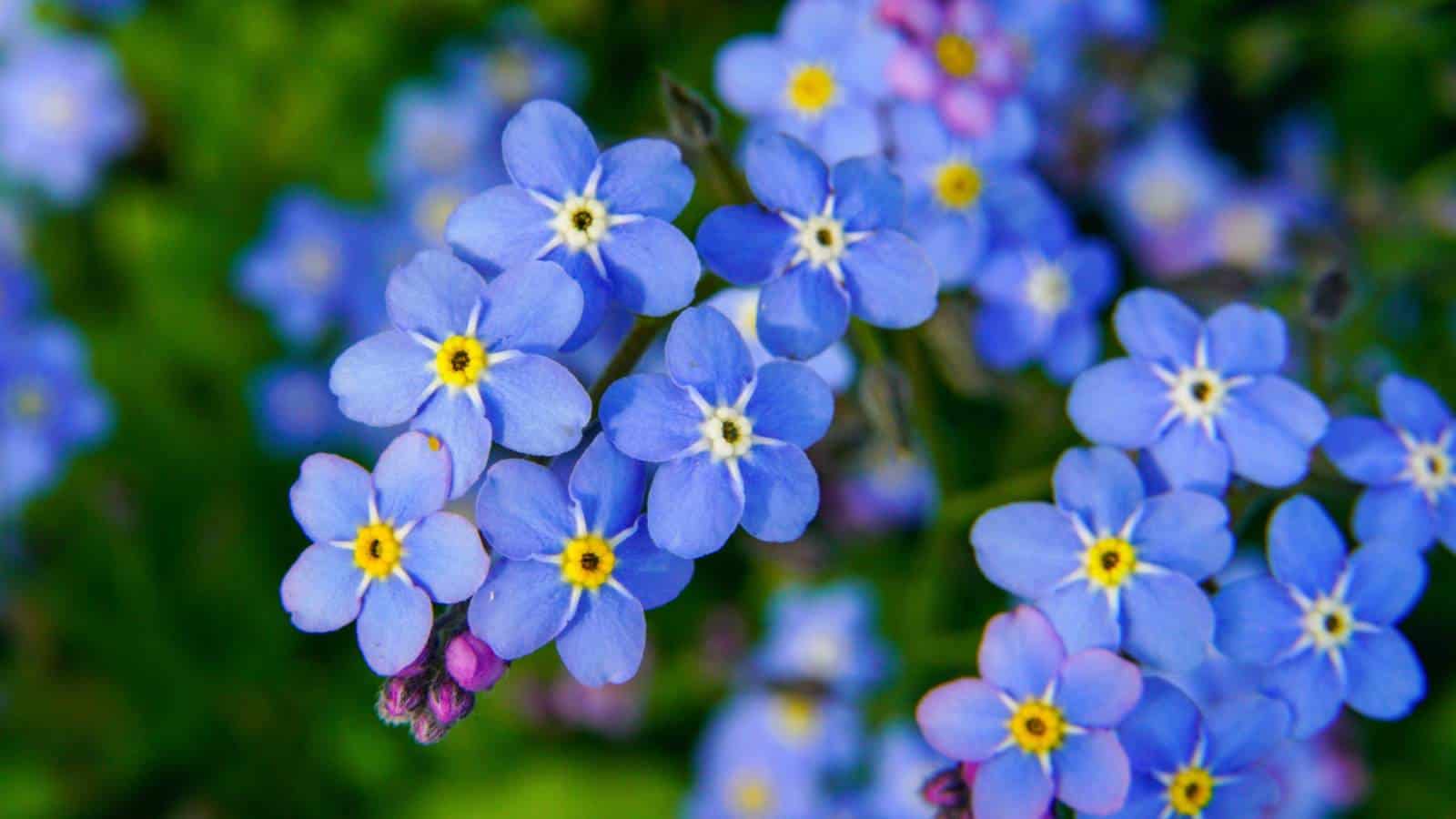
- Botanical Name: Myosotis spp.
- Hardiness Zones: 3-9 (USDA)
- Plant Type: Annual or Perennial (depending on species)
- Sun Exposure: Full Sun to Partial Shade
Forget-Me-Nots are delicate, sky-blue flowers with yellow centers. They symbolize true love and loyalty. These woodland plants thrive in moist, shaded areas, making them ideal for shaded borders and woodland gardens.
-
Love-in-a-Mist (Nigella damascena)

- Botanical Name: Nigella damascena
- Hardiness Zones: 2-11 (USDA)
- Plant Type: Annual
- Sun Exposure: Full Sun to Partial Shade
Nigella damascena, also known as Love-in-a-Mist, features finely cut leaves and star-shaped, sky-blue flowers surrounded by a mist of delicate foliage. They self-sow readily, creating a charming, natural look in gardens.
-
Siberian Bugloss (Brunnera macrophylla)
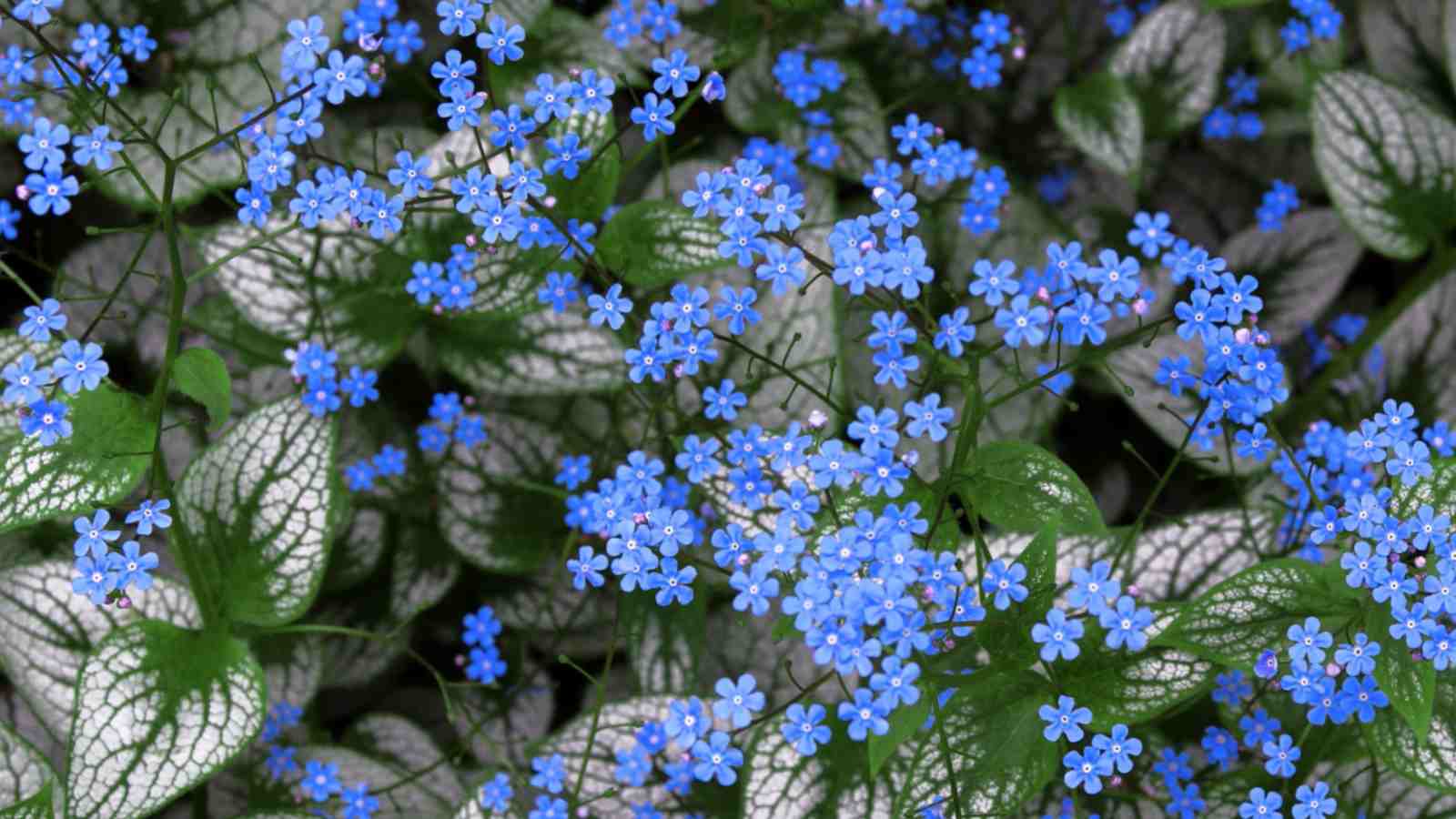
- Botanical Name: Brunnera macrophylla
- Hardiness Zones: 3-8 (USDA)
- Plant Type: Perennial
- Sun Exposure: Full Shade to Partial Shade
Brunnera macrophylla showcases heart-shaped leaves and small, bright blue flowers resembling forget-me-nots. This shade-loving perennial adds elegance and color to woodland gardens and shaded borders.
-
Perennial Geranium ‘Johnson’s Blue’ (Geranium spp.)

- Botanical Name: Geranium spp.
- Hardiness Zones: 4-8 (USDA)
- Plant Type: Perennial
- Sun Exposure: Full Sun to Partial Shade
Perennial Geranium ‘Johnson’s Blue’ features saucer-shaped, vivid blue flowers above deeply cut foliage. It blooms profusely in spring and summer, attracting butterflies. Ideal for borders and cottage gardens.
-
Lily of the Nile (Agapanthus africanus)

- Botanical Name: Agapanthus africanus
- Hardiness Zones: 6-11 (USDA)
- Plant Type: Perennial
- Sun Exposure: Full Sun to Partial Shade
Lily of the Nile displays clusters of trumpet-shaped, blue flowers on tall stalks. It’s a low-maintenance plant, perfect for borders and containers. It adds a touch of exotic beauty to gardens.
-
Azure Aster (Aster azureus)

- Botanical Name: Aster azureus
- Hardiness Zones: 3-8 (USDA)
- Plant Type: Perennial
- Sun Exposure: Full Sun
Aster azureus features daisy-like, lavender-blue flowers with yellow centers. It’s a late-season bloomer, providing a burst of color in fall gardens. Butterflies adore its nectar-rich blooms. These flowers will bloom from late summer up until the first frost of the year.
-
Bachelor’s Button (Centaurea cyanus)
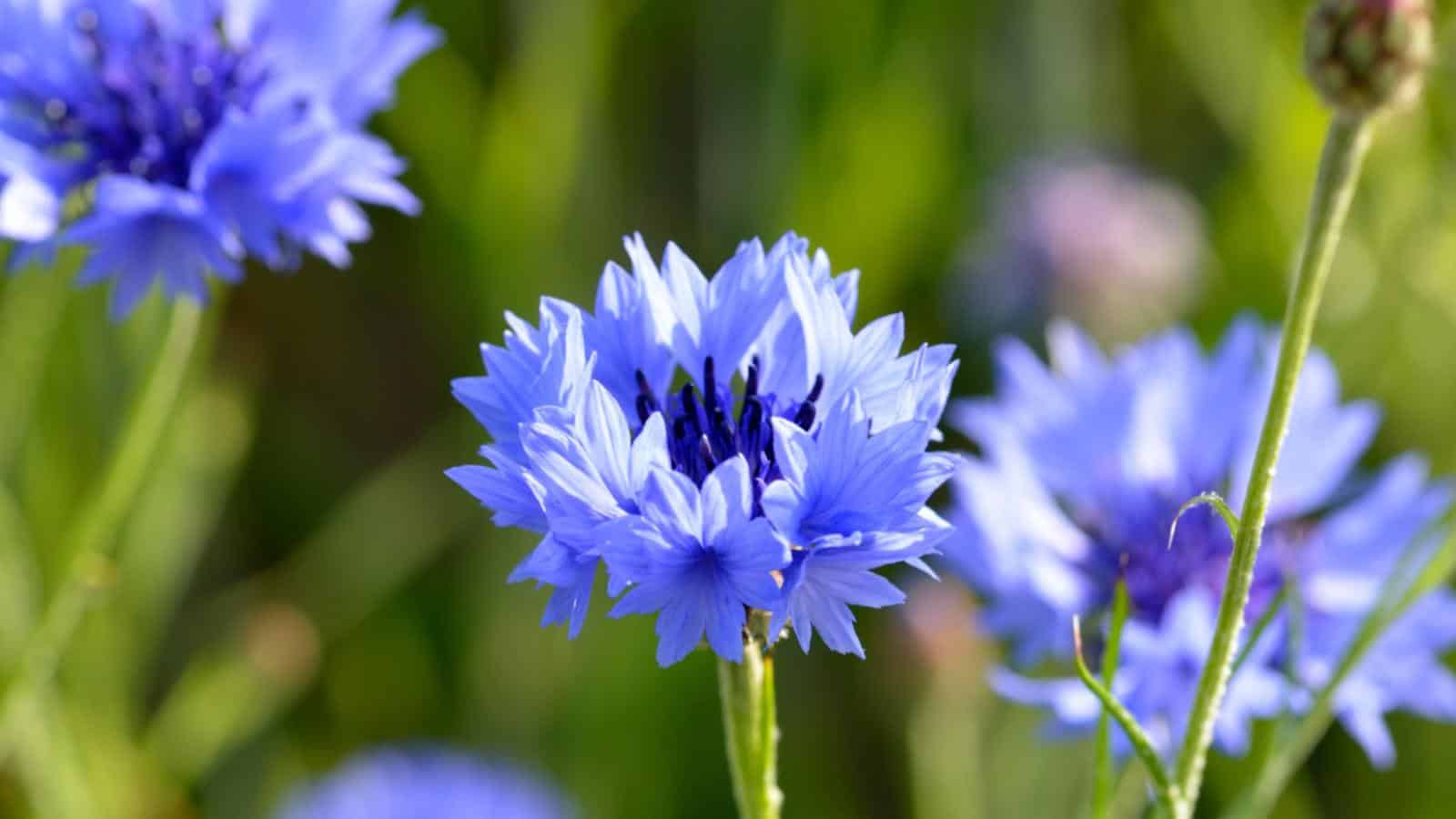
- Botanical Name: Centaurea cyanus
- Hardiness Zones: 2-11 (USDA)
- Plant Type: Annual
- Sun Exposure: Full Sun
Bachelor’s Button, or Cornflower, has vibrant blue petals and a contrasting yellow center. It’s a popular cut flower and attracts bees and butterflies. It thrives in poor soil, making it suitable for wildflower gardens.
-
Virginia Bluebells (Mertensia virginica)

- Botanical Name: Mertensia virginica
- Hardiness Zones: 3-8
- Plant Type: Perennial
- Sun Exposure: Full Shade to Partial Shade
Virginia Bluebells feature drooping clusters of tubular, sky-blue flowers. They bloom in early spring and prefer woodland conditions. Their lovely blue hue adds charm to shade gardens and naturalistic landscapes.
-
Blue Glorybower (Clerodendrum ugandense)
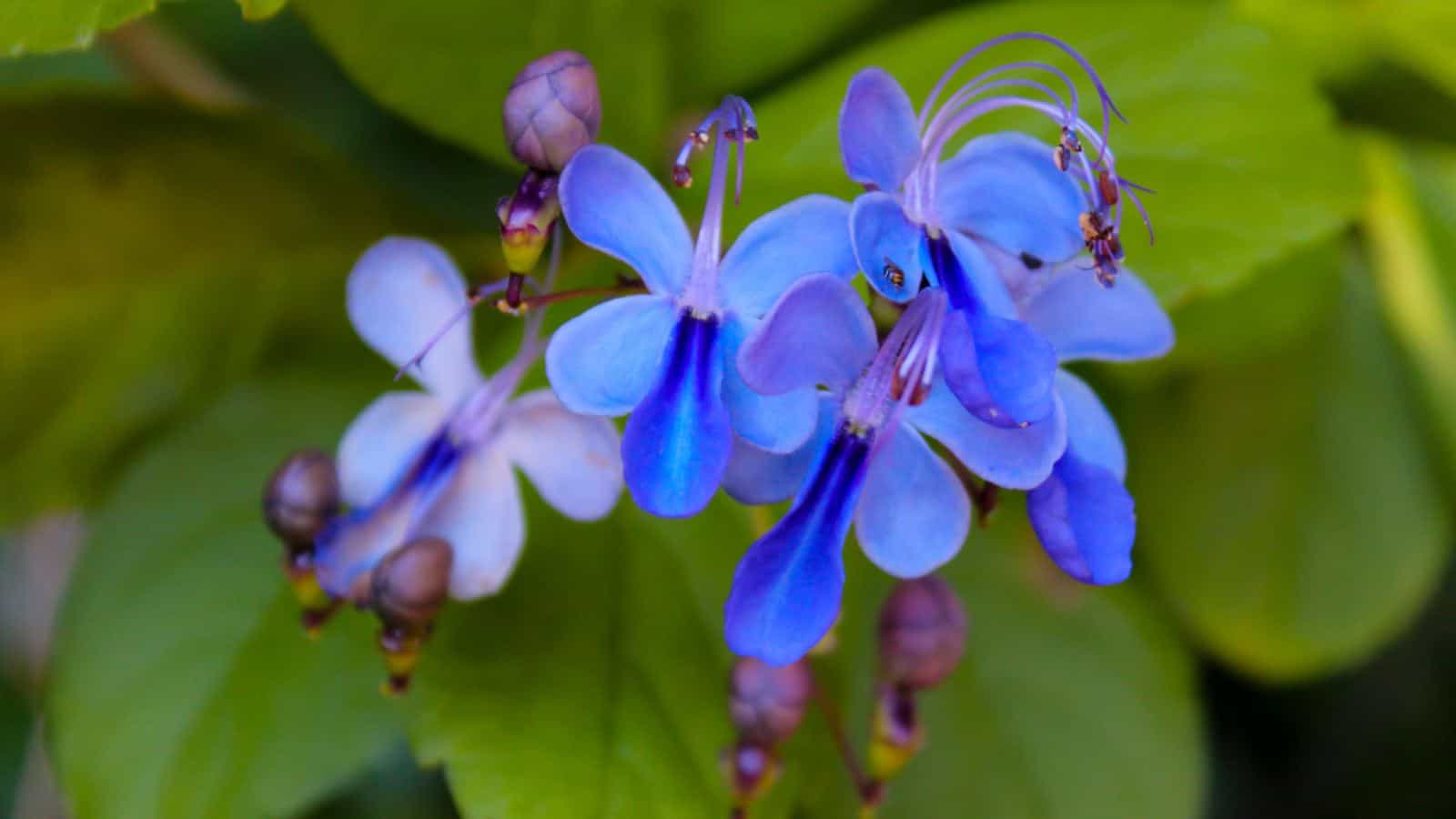
- Botanical Name: Clerodendrum ugandense
- Hardiness Zones: 10-11 (USDA)
- Plant Type: Shrub
- Sun Exposure: Full Sun to Partial Shade
Blue Glorybower features clusters of bright blue flowers with white centers. It’s a tropical shrub that blooms throughout the year. It’s a favorite of butterflies and adds a splash of vibrant color to gardens.
-
Himalayan Blue Poppy (Meconopsis betonicifolia)
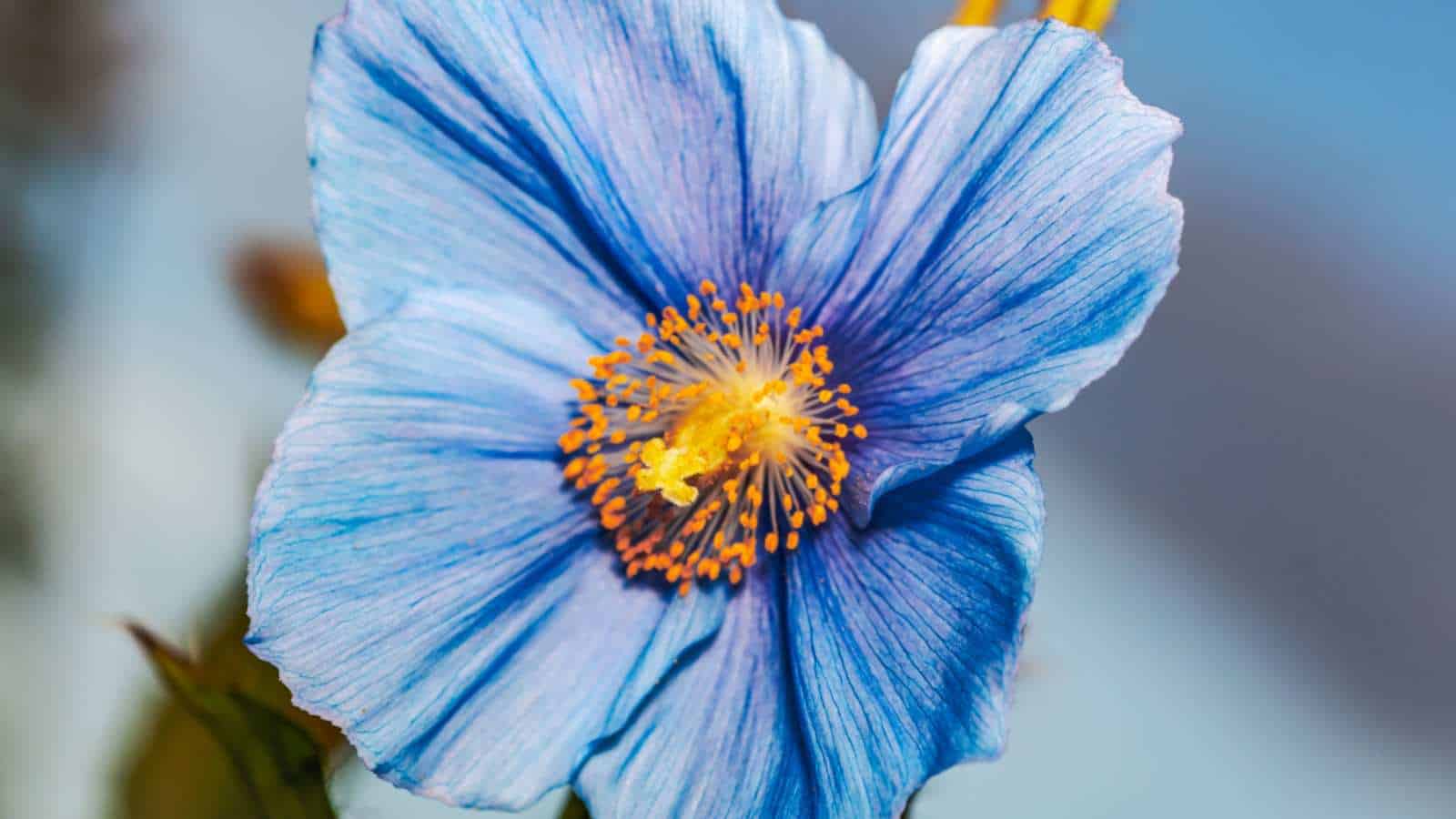
- Botanical Name: Meconopsis betonicifolia
- Hardiness Zones: 7-9 (USDA)
- Plant Type: Perennial
- Sun Exposure: Partial Shade to Full Sun
Himalayan Blue Poppy showcases large, sky-blue blooms on sturdy stems. It thrives in cool, moist conditions and adds a touch of exotic beauty to woodland gardens and shaded borders.
-
Blue Lobelia (Lobelia erinus)

- Botanical Name: Lobelia erinus
- Hardiness Zones: 2-11 (USDA)
- Plant Type: Annual
- Sun Exposure: Full Sun to Partial Shade
Blue Lobelia displays profuse clusters of deep blue, tubular flowers. It’s excellent for hanging baskets and containers, creating a cascading waterfall of blue blooms.
-
Blue Hosta (Hosta spp.)

- Botanical Name: Hosta spp.
- Hardiness Zones: 3-9 (USDA)
- Plant Type: Perennial
- Sun Exposure: Full Shade to Partial Shade
Blue Hosta features heart-shaped leaves in various shades of blue. While primarily grown for foliage, some varieties produce lavender-blue flowers on tall spikes, adding elegance to shade gardens.
-
Anise Sage (Salvia guaranitica)
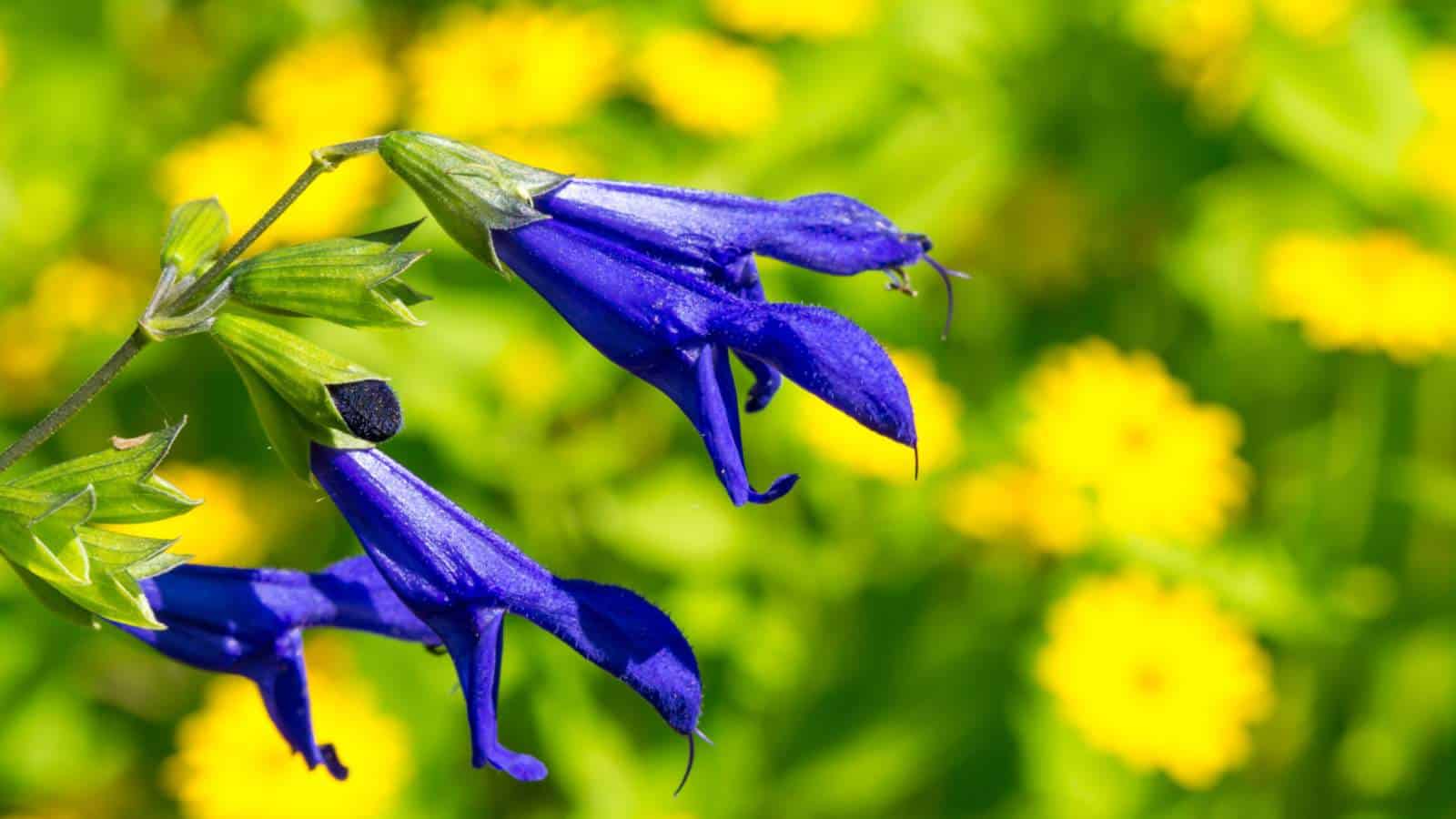
- Botanical Name: Salvia guaranitica
- Hardiness Zones: 7-10 (USDA)
- Plant Type: Perennial
- Sun Exposure: Full Sun
Blue Sage, also known as Anise Sage, features long spikes of deep blue flowers and aromatic foliage. It’s a magnet for hummingbirds and butterflies, making it a favorite in wildlife gardens.
-
Blue Butterwort (Pinguicula caerulea)
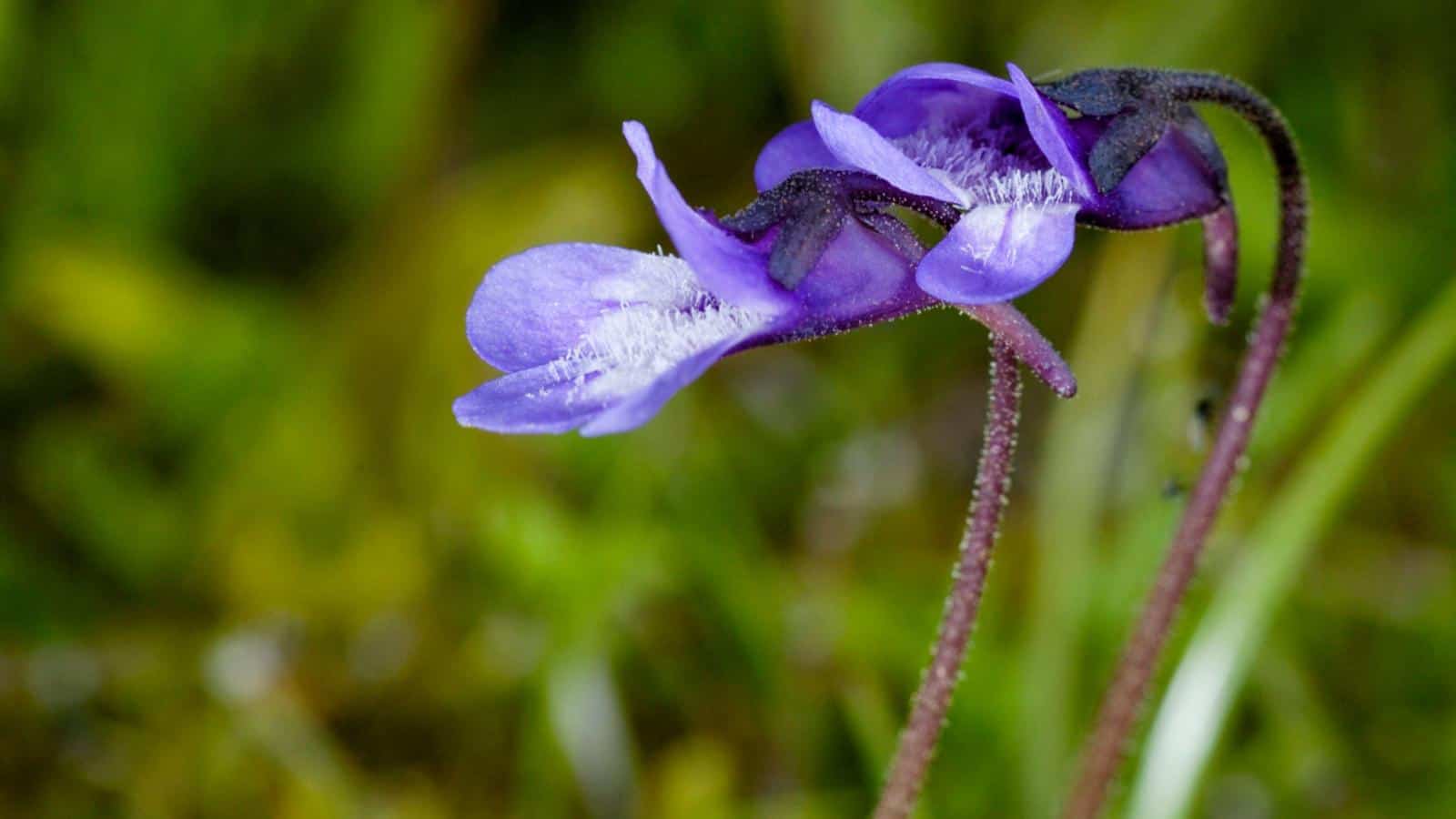
- Botanical Name: Pinguicula caerulea
- Hardiness Zones: 8-11 (USDA)
- Plant Type: Perennial Carnivorous Plant
- Sun Exposure: Partial Sun to Full Sun
Blue Butterwort has delicate blue flowers and forms rosettes of sticky leaves to trap insects. It’s a carnivorous plant that thrives in moist, acidic soil, providing a unique addition to bog gardens.
-
Blue Thunbergia (Thunbergia grandiflora)
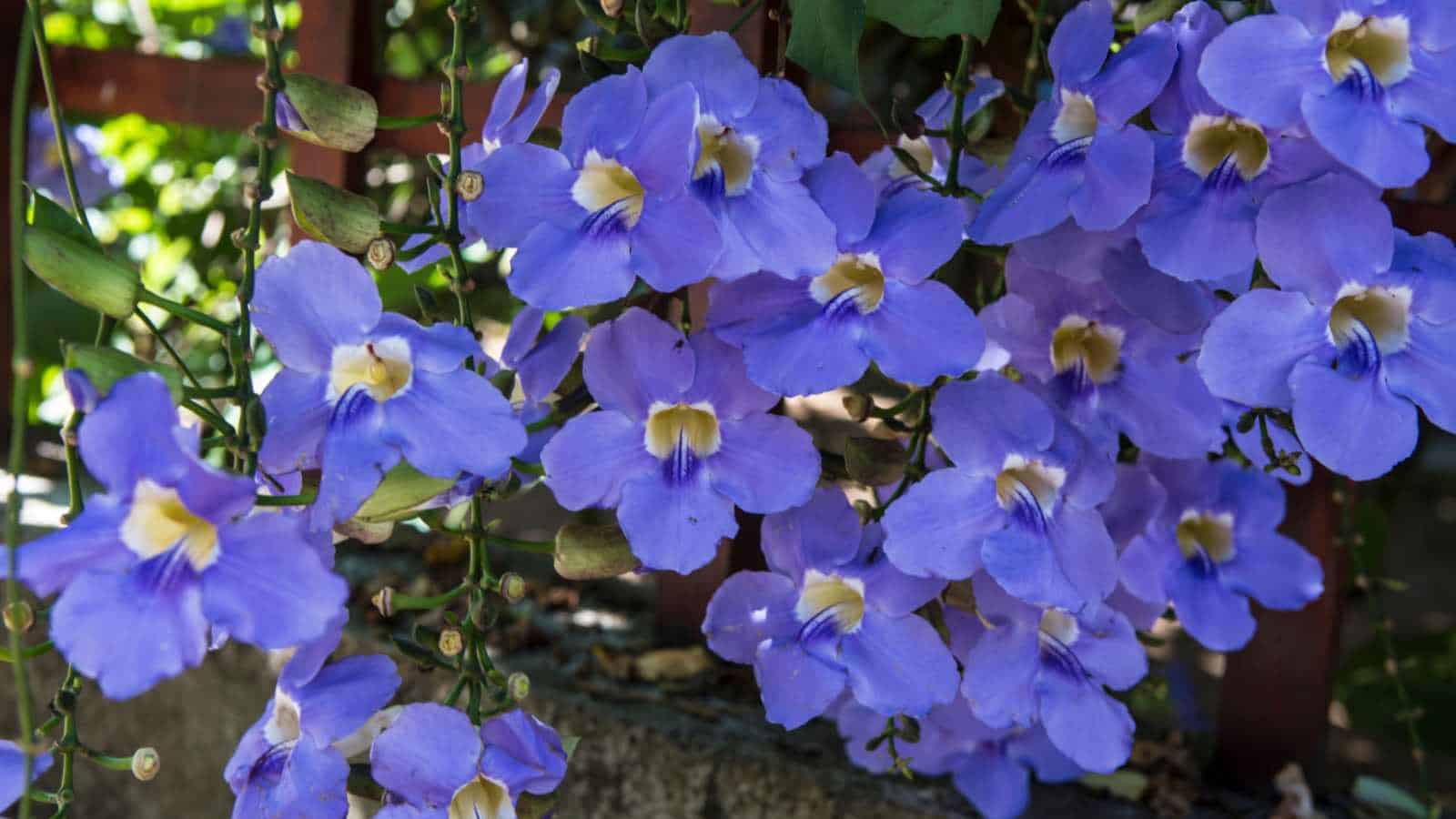
- Botanical Name: Thunbergia grandiflora
- Hardiness Zones: 9-11 (USDA)
- Plant Type: Perennial Vine
- Sun Exposure: Full Sun to Partial Shade
Blue Thunbergia, or Skyflower, showcases large, sky-blue flowers with contrasting yellow centers. It’s a fast-growing vine that adds a tropical flair to arbors, fences, and trellises.
-
Blue Dawn Flower (Stictocardia beraviensis)

- Botanical Name: Stictocardia beraviensis
- Hardiness Zones: 10-11 (USDA)
- Plant Type: Perennial Vine
- Sun Exposure: Full Sun
Blue Dawn Flower features large, sky-blue, funnel-shaped blooms. It’s a fast-growing vine that thrives in warm climates, adding a tropical touch to pergolas and fences.
-
Blue Throatwort (Collinsia heterophylla)

- Botanical Name: Collinsia heterophylla
- Hardiness Zones: 3-9 (USDA)
- Plant Type: Annual
- Sun Exposure: Full Sun to Partial Shade
Blue Throatwort displays clusters of blue flowers with white throats. It’s a charming wildflower that self-sows readily, making it a delightful addition to cottage gardens and meadows.
-
Blue Cardinal Flower (Lobelia siphilitica)

- Botanical Name: Lobelia siphilitica
- Hardiness Zones: 3-9 (USDA)
- Plant Type: Perennial
- Sun Exposure: Full Sun to Partial Shade
Blue Cardinal Flower bears spikes of intense blue, tubular flowers on tall stems. It’s a favorite of hummingbirds and adds a vibrant splash of color to wetland gardens and pond edges.
-
Blue Gilia (Gilia aggregata)

- Botanical Name: Gilia aggregata
- Hardiness Zones: 3-10 (USDA)
- Plant Type: Annual
- Sun Exposure: Full Sun
Blue Gilia, also known as Skyrocket, produces clusters of sky-blue flowers atop tall stems. It’s a wildflower native to western North America, adding a natural touch to meadows and xeriscapes.
-
Blue Brodiaea (Brodiaea pulchella)

- Botanical Name: Brodiaea pulchella
- Hardiness Zones: 7-10 (USDA)
- Plant Type: Perennial
- Sun Exposure: Full Sun
Blue Brodiaea bears clusters of star-shaped, blue-violet flowers. It’s a bulbous plant native to California and thrives in well-drained soil, making it an excellent choice for rock gardens.
-
Blue Cardinal Climber (Ipomoea horsfalliae)

- Botanical Name: Ipomoea horsfalliae
- Hardiness Zones: 10-11 (USDA)
- Plant Type: Perennial Vine
- Sun Exposure: Full Sun to Partial Shade
Blue Cardinal Climber, or Prince Kuhio Vine, features tubular, blue-violet flowers and glossy, dark green leaves. It’s a vigorous vine that adds a tropical touch to fences, arbors, and trellises.
-
Blue Pea Bush (Strobilanthes cusia)

- Botanical Name: Strobilanthes cusia
- Hardiness Zones: 10-11 (USDA)
- Plant Type: Shrub
- Sun Exposure: Full Sun to Partial Shade
Blue Pea Bush, or Neela Kurinji, showcases spikes of indigo-blue flowers. It’s a rare and unique shrub native to India, blooming once every 12 years, adding a sense of mystery to gardens.
-
Blue Trumpet Vine (Thunbergia battiscombei)
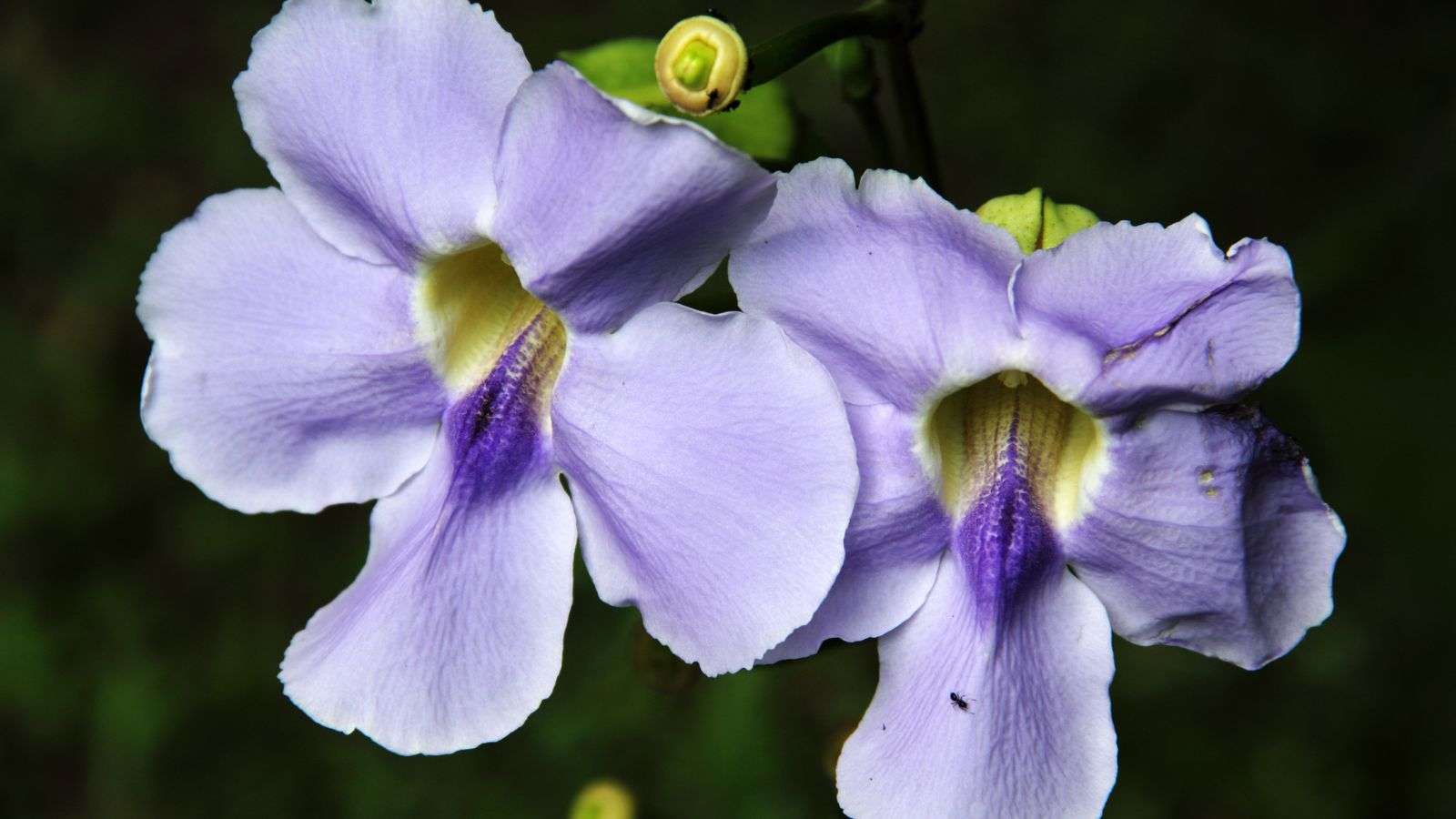
- Botanical Name: Thunbergia battiscombei
- Hardiness Zones: 10-11 (USDA)
- Plant Type: Perennial Vine
- Sun Exposure: Full Sun
Blue Trumpet Vine features deep blue, trumpet-shaped flowers and lush green foliage. It’s a fast-growing vine that attracts hummingbirds and butterflies, creating a colorful focal point in gardens.
-
Blue Honeywort (Cerinthe major‘Purpurascens’)

- Botanical Name: Cerinthe major ‘Purpurascens’
- Hardiness Zones: 3-11 (USDA)
- Plant Type: Annual
- Sun Exposure: Full Sun to Partial Shade
Blue Honeywort has clusters of blue-violet, tubular flowers surrounded by blue-green leaves. It’s a unique and easy-to-grow plant that self-seeds, adding an exotic touch to cottage gardens.
-
Himalayan Blue Sheep (Pseudorchis albida)

- Botanical Name: Pseudorchis albida
- Hardiness Zones: 5-8 (USDA)
- Plant Type: Perennial
- Sun Exposure: Partial Shade to Full Sun
Himalayan Blue Sheep, also known as Small White Orchid, showcases delicate blue flowers on slender stems. It’s a rare and charming orchid species.
-
Blue Wheatgrass (Agropyron caninum)
- Botanical Name: Agropyron caninum
- Hardiness Zones: 4-9 (USDA)
- Plant Type: Perennial Grass
- Sun Exposure: Full Sun
Blue Wheatgrass features slender blue-green blades and gracefully arching seed heads. It’s drought-tolerant and adds a touch of elegance to gardens.
-
Blue-eyed Mary (Collinsia verna)

- Botanical Name: Collinsia verna
- Hardiness Zones: 5-9 (USDA)
- Plant Type: Annual
- Sun Exposure: Partial Shade to Full Sun
Blue-eyed Mary bears clusters of blue, tubular flowers with white centers. It’s a woodland plant that naturalizes well, creating a carpet of blue in spring.
-
Blue Dampiera (Dampiera stricta)
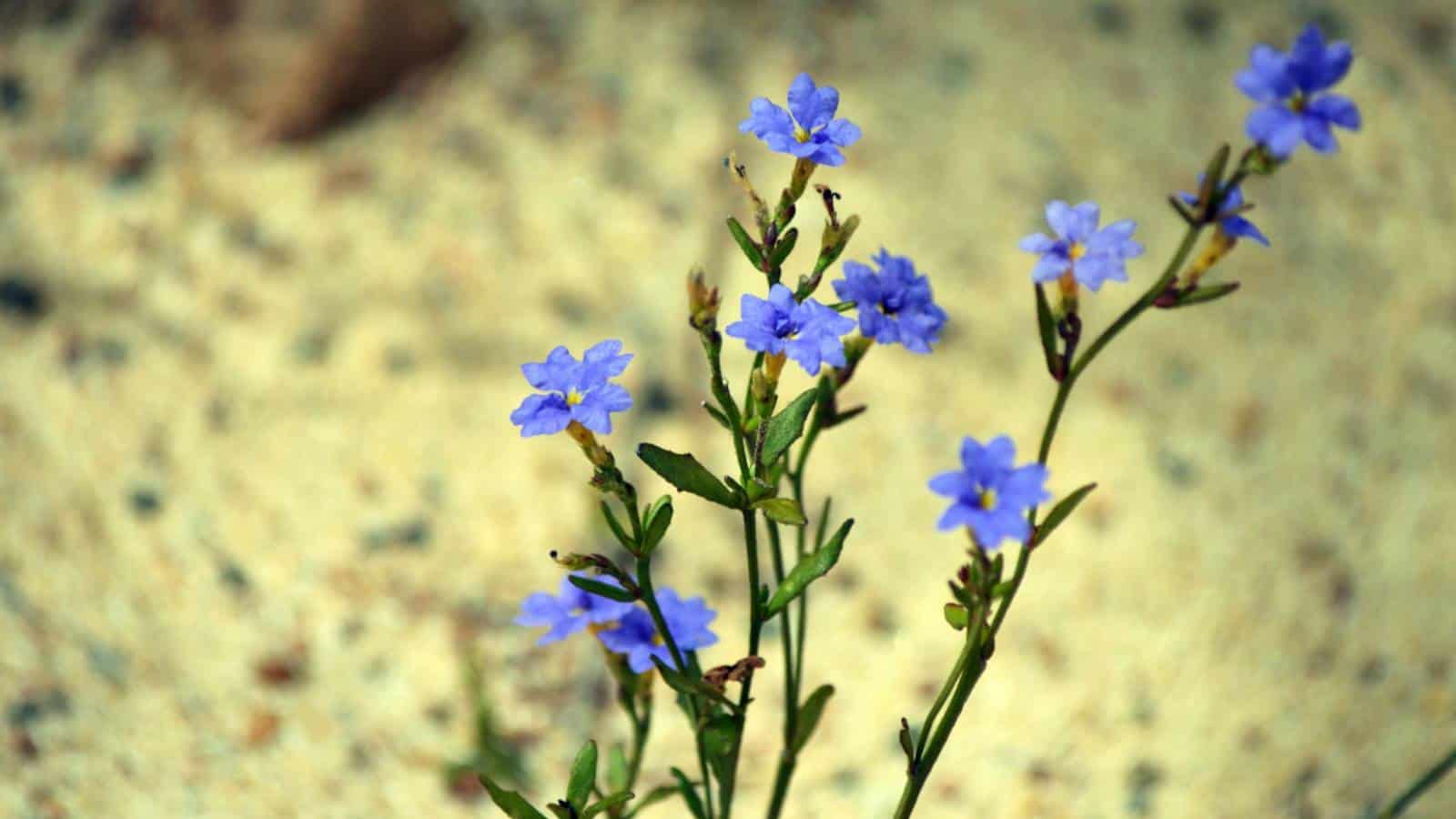
- Botanical Name: Dampiera stricta
- Hardiness Zones: 9-11 (USDA)
- Plant Type: Perennial
- Sun Exposure: Full Sun
Blue Dampiera displays bright blue flowers with yellow centers. It’s a low-growing, spreading plant that thrives in coastal areas and sandy soils.
-
Blue Alkanet (Alkanna tinctoria)

- Botanical Name: Alkanna tinctoria
- Hardiness Zones: 3-8 (USDA)
- Plant Type: Perennial
- Sun Exposure: Full Sun to Partial Shade
Blue Alkanet features intense blue, funnel-shaped flowers and hairy leaves. It’s often used for natural dyeing and has medicinal properties.
-
Blue Spiderwort (Tradescantia ohiensis)

- Botanical Name: Tradescantia ohiensis
- Hardiness Zones: 5-9 (USDA)
- Plant Type: Perennial
- Sun Exposure: Full Sun to Partial Shade
Blue Spiderwort bears clusters of blue to violet flowers atop strappy leaves. It’s a resilient plant, perfect for cottage gardens and naturalistic landscapes.
-
Blue Japanese Iris (Iris ensata)
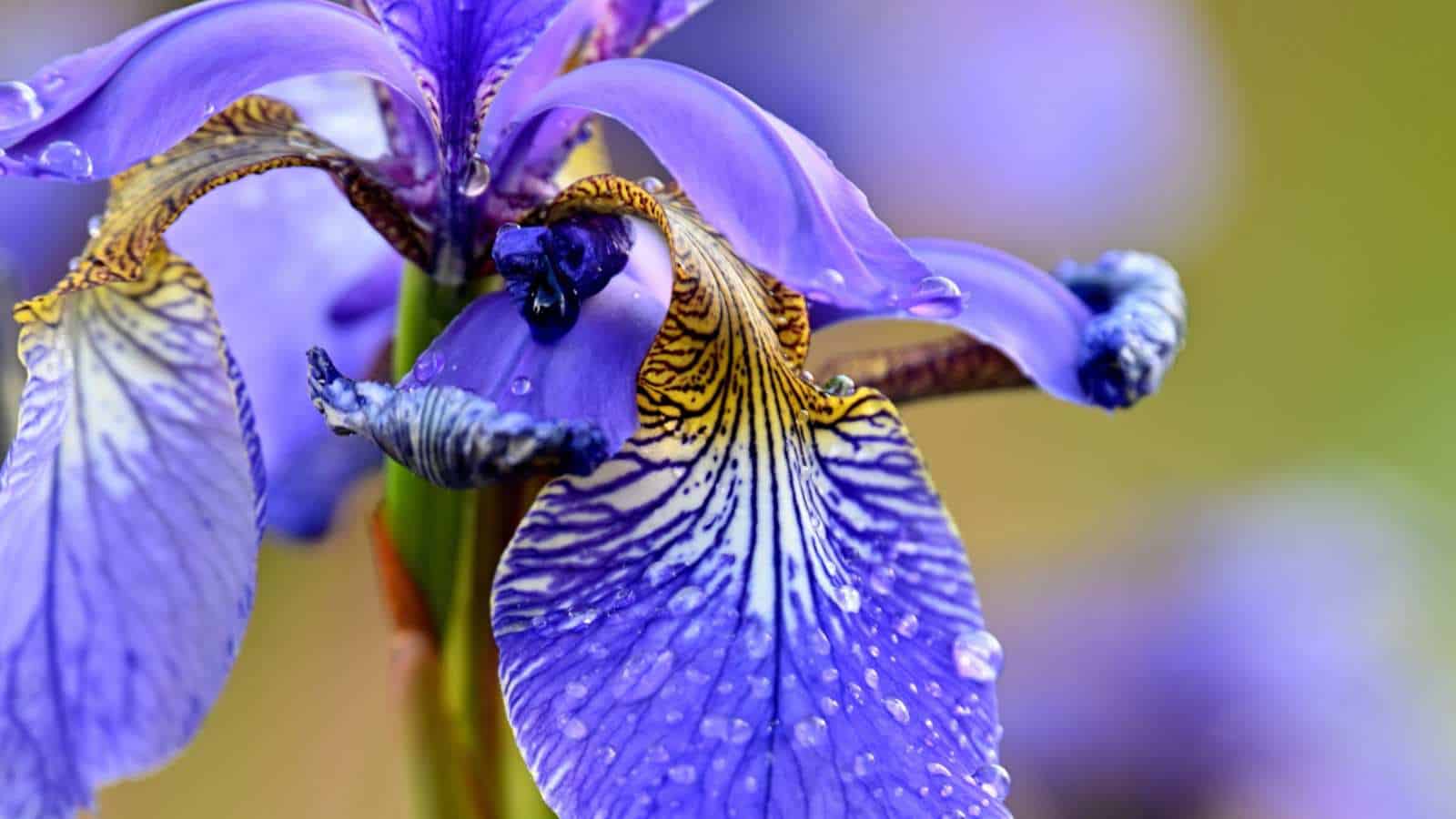
- Botanical Name: Iris ensata
- Hardiness Zones: 4-9 (USDA)
- Plant Type: Perennial
- Sun Exposure: Full Sun to Partial Shade
Blue Japanese Iris showcases large, intricate blue flowers with white and yellow markings. It’s a water-loving plant, ideal for pond edges and damp areas.
-
Blue Hyssop (Hyssopus officinalis)
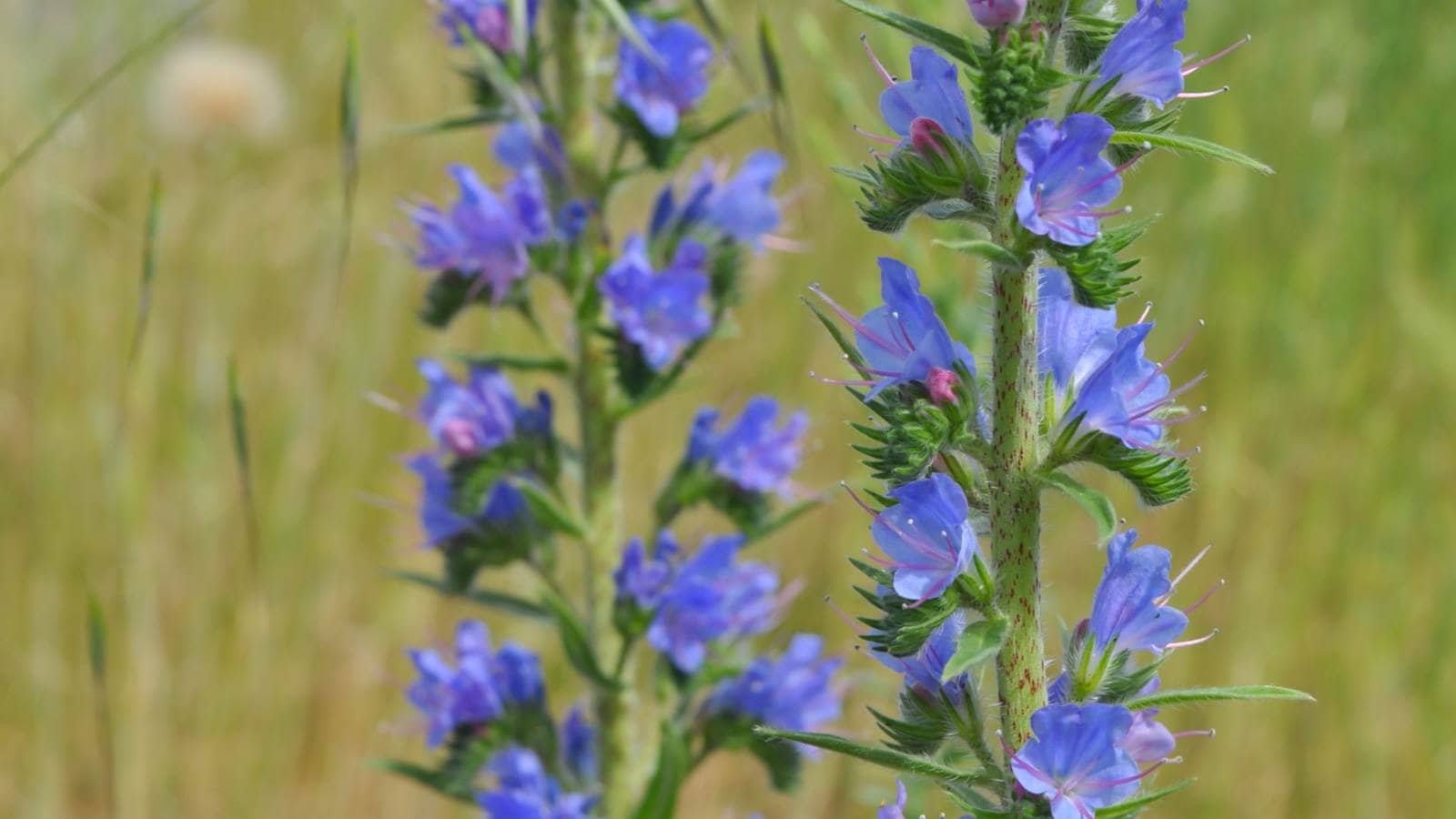
- Botanical Name: Hyssopus officinalis
- Hardiness Zones: 3-9 (USDA)
- Plant Type: Perennial
- Sun Exposure: Full Sun
Blue Hyssop produces spikes of small, tubular blue flowers. It’s a fragrant herb often used in culinary dishes and traditional medicine.
-
Blue Camass (Camassia quamash)
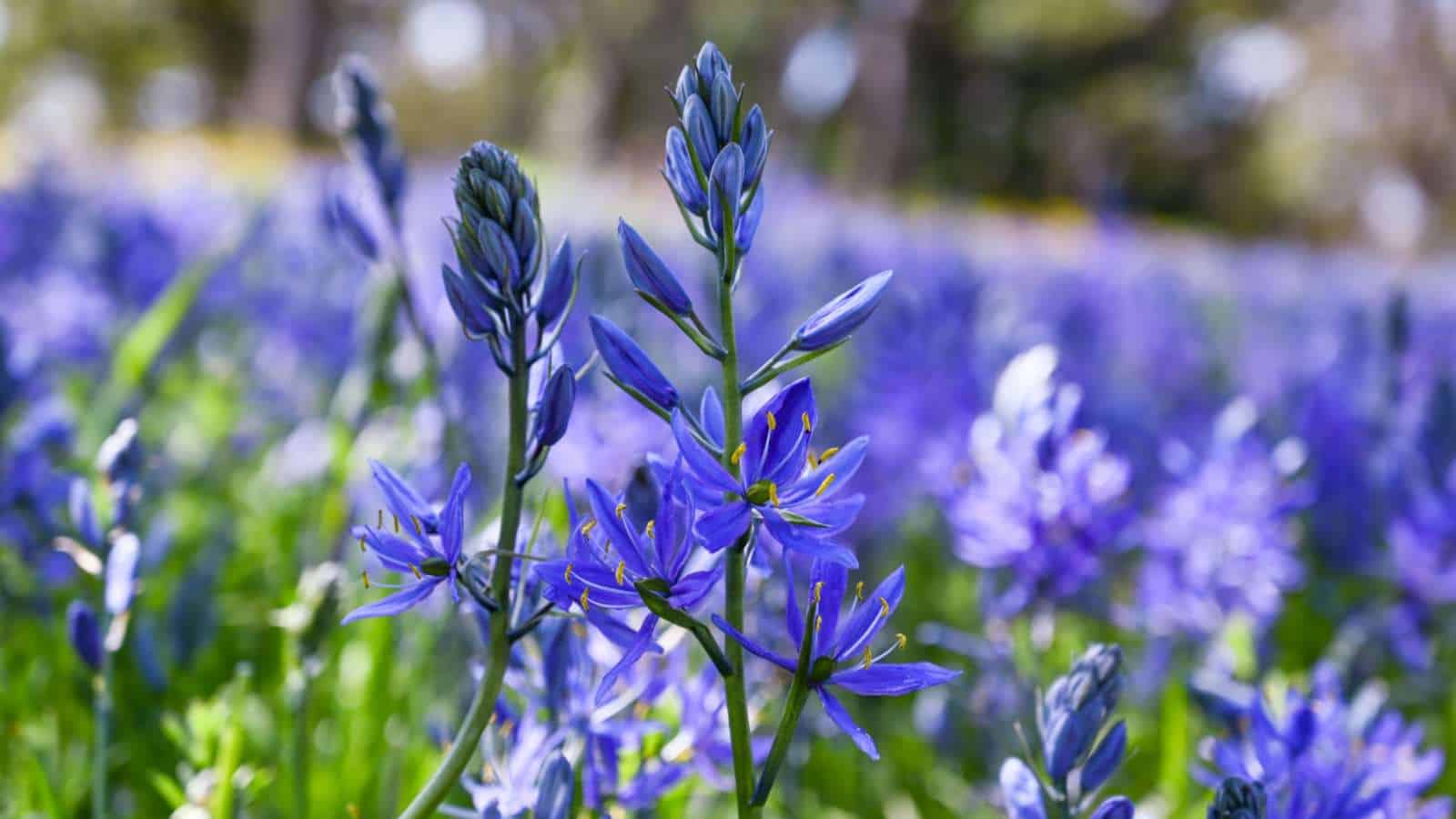
- Botanical Name: Camassia quamash
- Hardiness Zones: 4-9 (USDA)
- Plant Type: Perennial
- Sun Exposure: Full Sun to Partial Shade
Blue Camass features star-shaped blue flowers on tall spikes. It’s a native wildflower and was an important food source for indigenous peoples.
-
Blue Monkshood (Aconitum carmichaelii)

- Botanical Name: Aconitum carmichaelii
- Hardiness Zones: 3-7 (USDA)
- Plant Type: Perennial
- Sun Exposure: Full Sun to Partial Shade
Blue Monkshood bears spikes of hooded blue flowers above deeply lobed leaves. It’s a poisonous plant and should be handled with care.
-
Blue Curls (Phacelia congesta)

- Botanical Name: Phacelia congesta
- Hardiness Zones: 5-10 (USDA)
- Plant Type: Annual
- Sun Exposure: Full Sun
Blue Curls display coiled clusters of blue to purple flowers. They are excellent for attracting bees and butterflies, enhancing pollination in gardens.
-
Blue Larkspur (Delphinium variegatum)
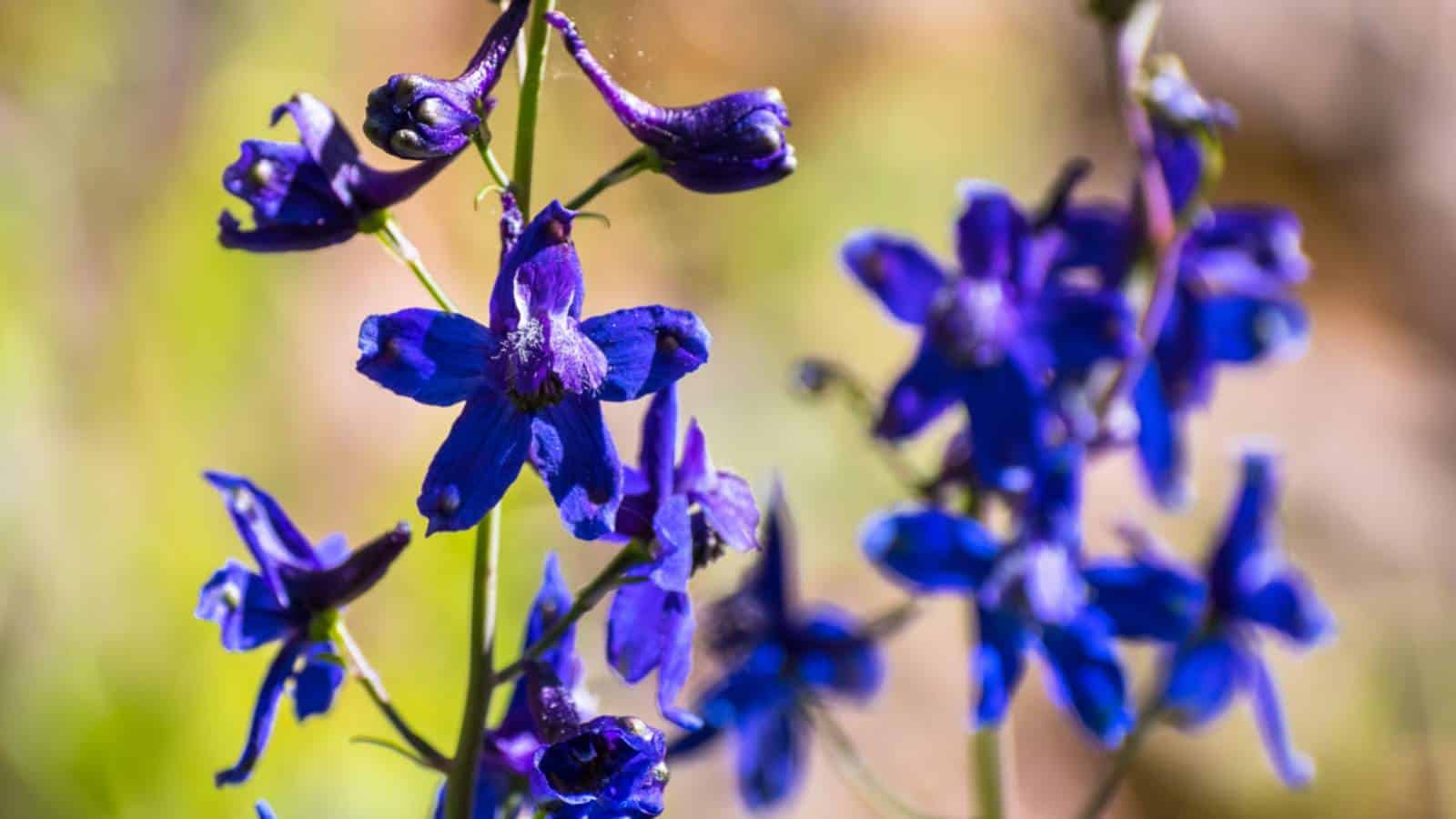
- Botanical Name: Delphinium variegatum
- Hardiness Zones: 3-8 (USDA)
- Plant Type: Perennial
- Sun Exposure: Full Sun
Blue Larkspur features tall spikes of blue flowers with white centers. It’s a striking plant, perfect for cottage gardens and adding vertical interest.
-
Blue Violets (Viola sororia)
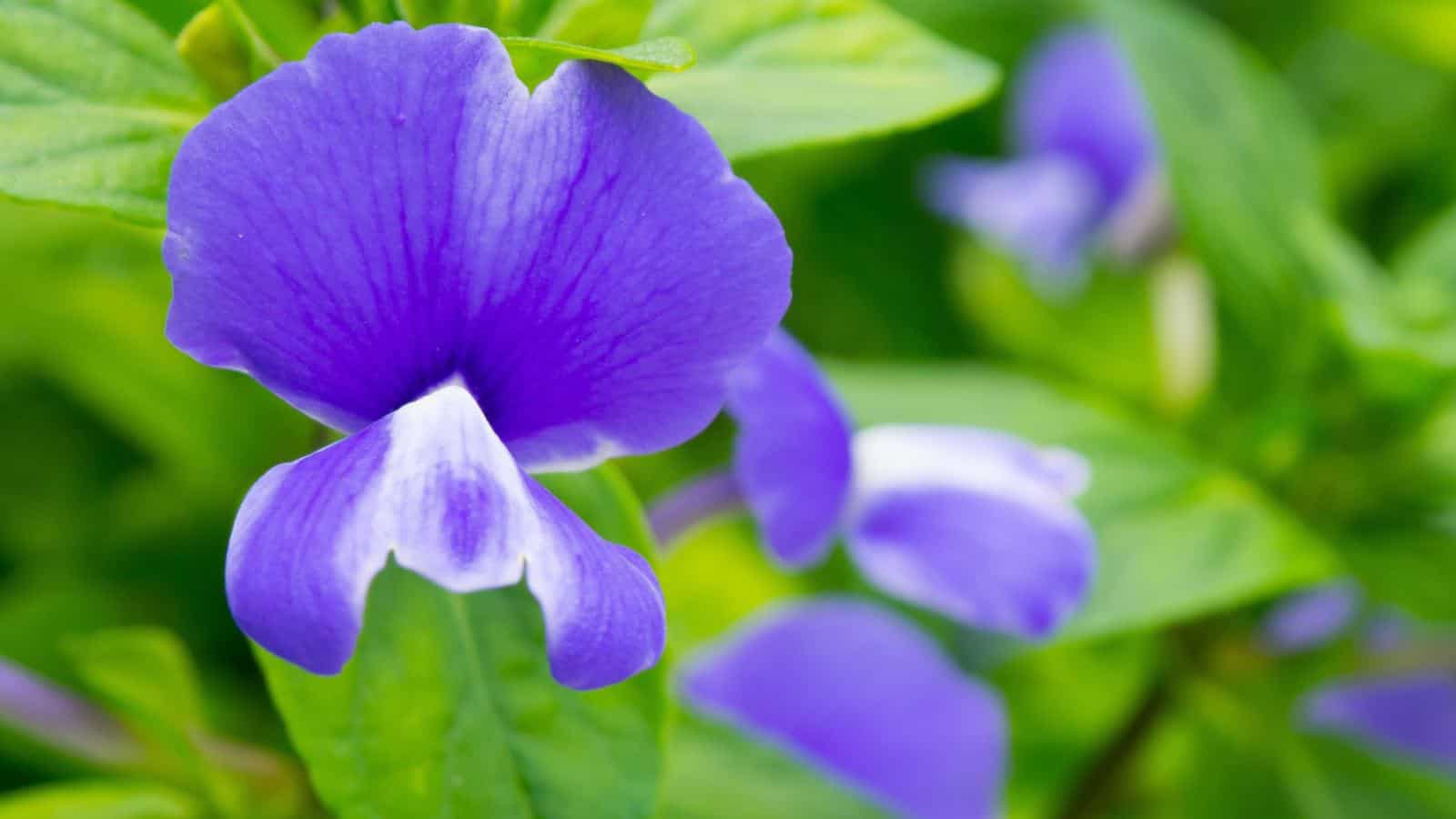
- Botanical Name: Viola sororia
- Hardiness Zones: 3-8 (USDA)
- Plant Type: Perennial
- Sun Exposure: Partial Shade to Full Sun
Blue Violets have heart-shaped leaves and blue to violet flowers. They naturalize well and are delightful additions to shaded areas.
-
Blue Lovegrass (Eragrostis spectabilis)

- Botanical Name: Eragrostis spectabilis
- Hardiness Zones: 5-9 (USDA)
- Plant Type: Perennial Grass
- Sun Exposure: Full Sun
Blue Lovegrass forms tufts of blue-green foliage and delicate, airy blue flowerheads. It’s drought-tolerant and adds movement to gardens.
-
Blue Pincushion Flower (Scabiosa columbaria)

- Botanical Name: Scabiosa columbaria
- Hardiness Zones: 3-8 (USDA)
- Plant Type: Perennial
- Sun Exposure: Full Sun
Blue Pincushion Flower features frilly blue flowers on long stems. It’s excellent for cutting gardens and attracts butterflies and bees.
-
Blue Squill (Scilla siberica)

- Botanical Name: Scilla siberica
- Hardiness Zones: 2-8 (USDA)
- Plant Type: Perennial Bulb
- Sun Exposure: Full Sun to Partial Shade
Blue Squill produces nodding, bell-shaped blue flowers in early spring. It naturalizes easily, creating a carpet of blue in gardens.
-
Blue Chilean Crocus (Tecophilaea cyanocrocus)
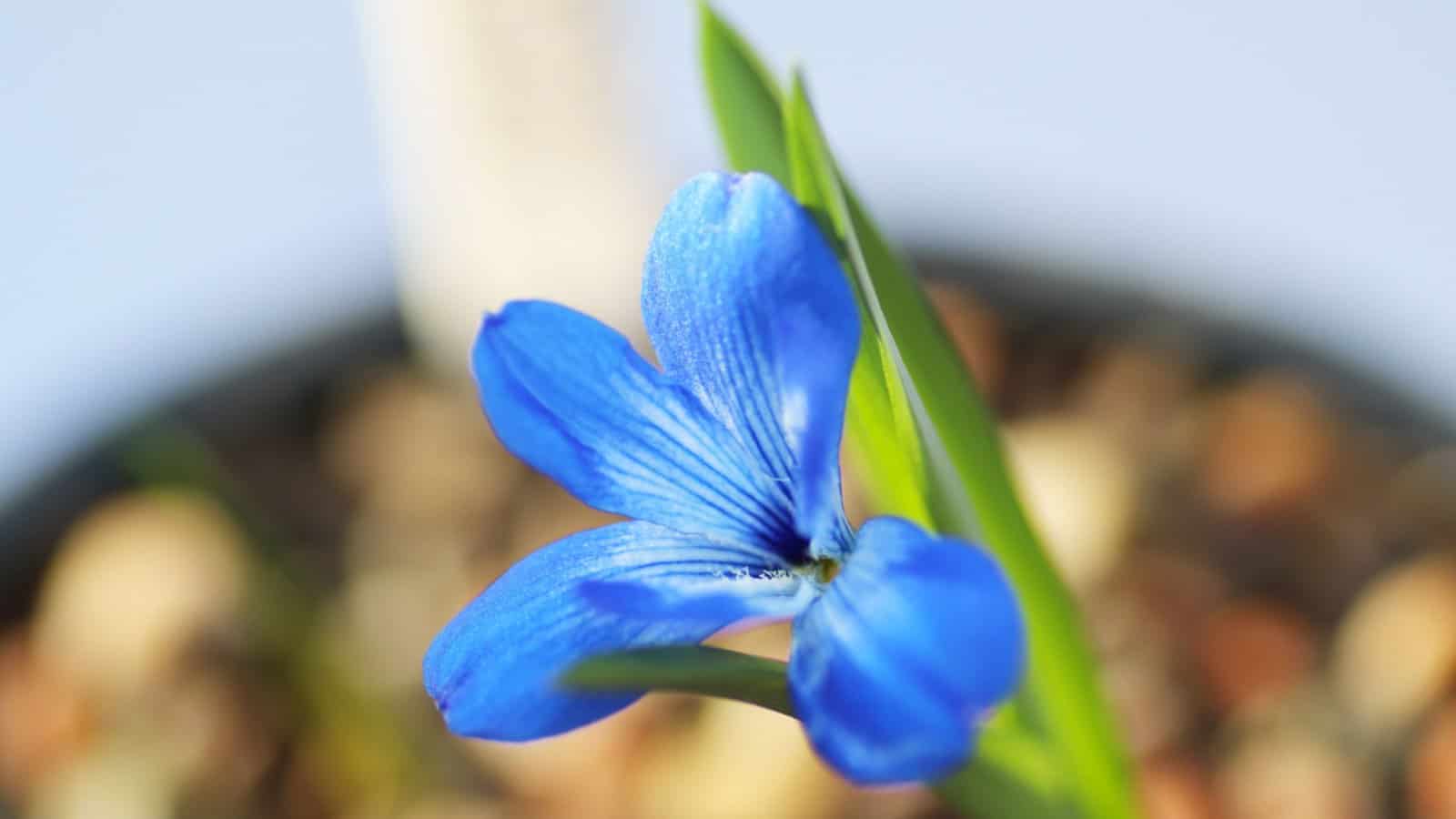
- Botanical Name: Tecophilaea cyanocrocus
- Hardiness Zones: 5-8 (USDA)
- Plant Type: Perennial Bulb
- Sun Exposure: Full Sun to Partial Shade
Blue Chilean Crocus offers stunning blue flowers with a central yellow eye. It’s a rare and treasured bulb plant for enthusiasts.
-
Blue Lace Flower (Didiscus caeruleus)
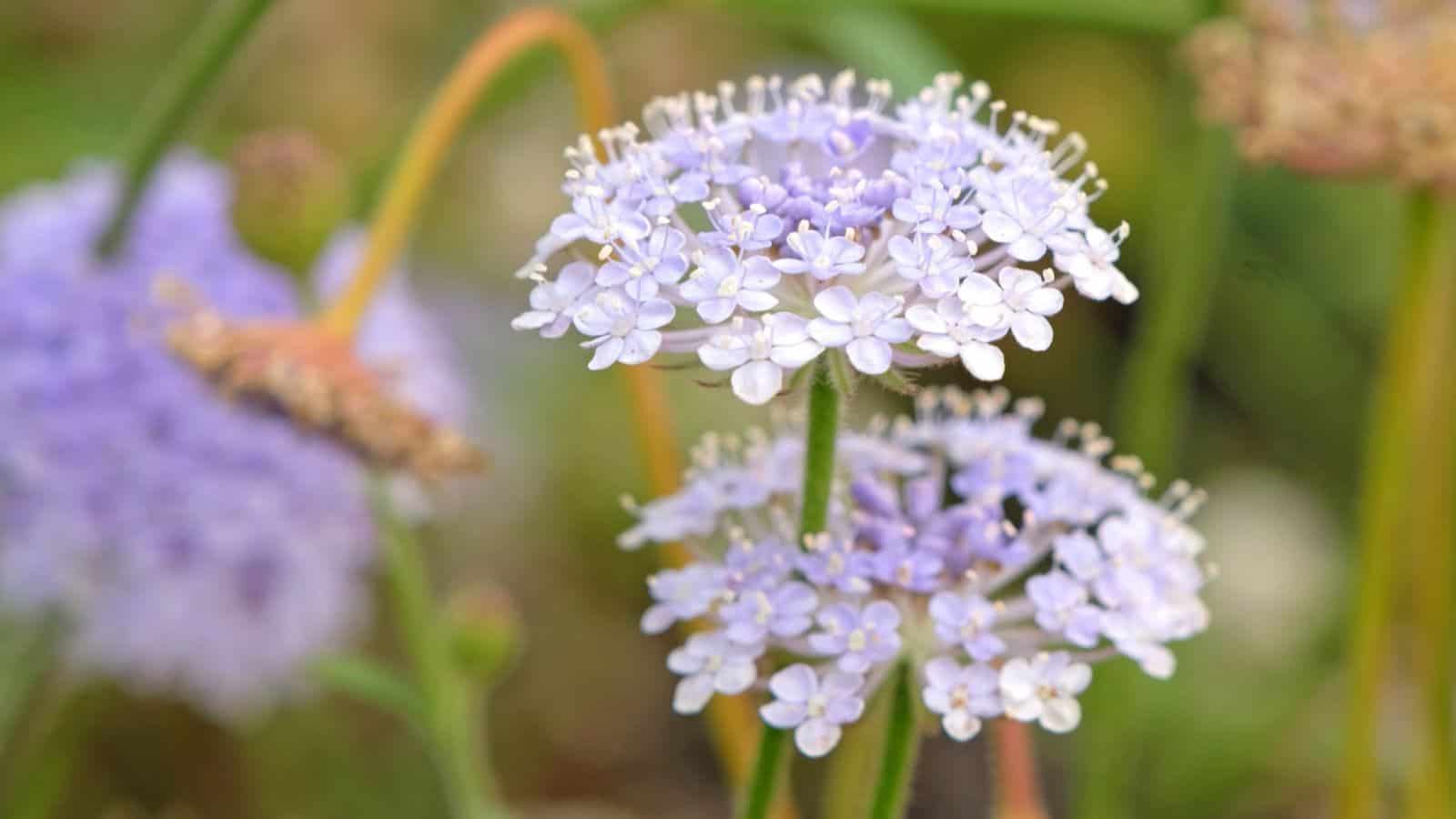
- Botanical Name: Didiscus caeruleus
- Hardiness Zones: 2-11 (USDA)
- Plant Type: Annual
- Sun Exposure: Full Sun
Blue Lace Flower produces delicate, lacy umbels of blue flowers. It’s an excellent filler plant in bouquets and floral arrangements.
-
Blue Viper’s Bugloss (Echium vulgare)
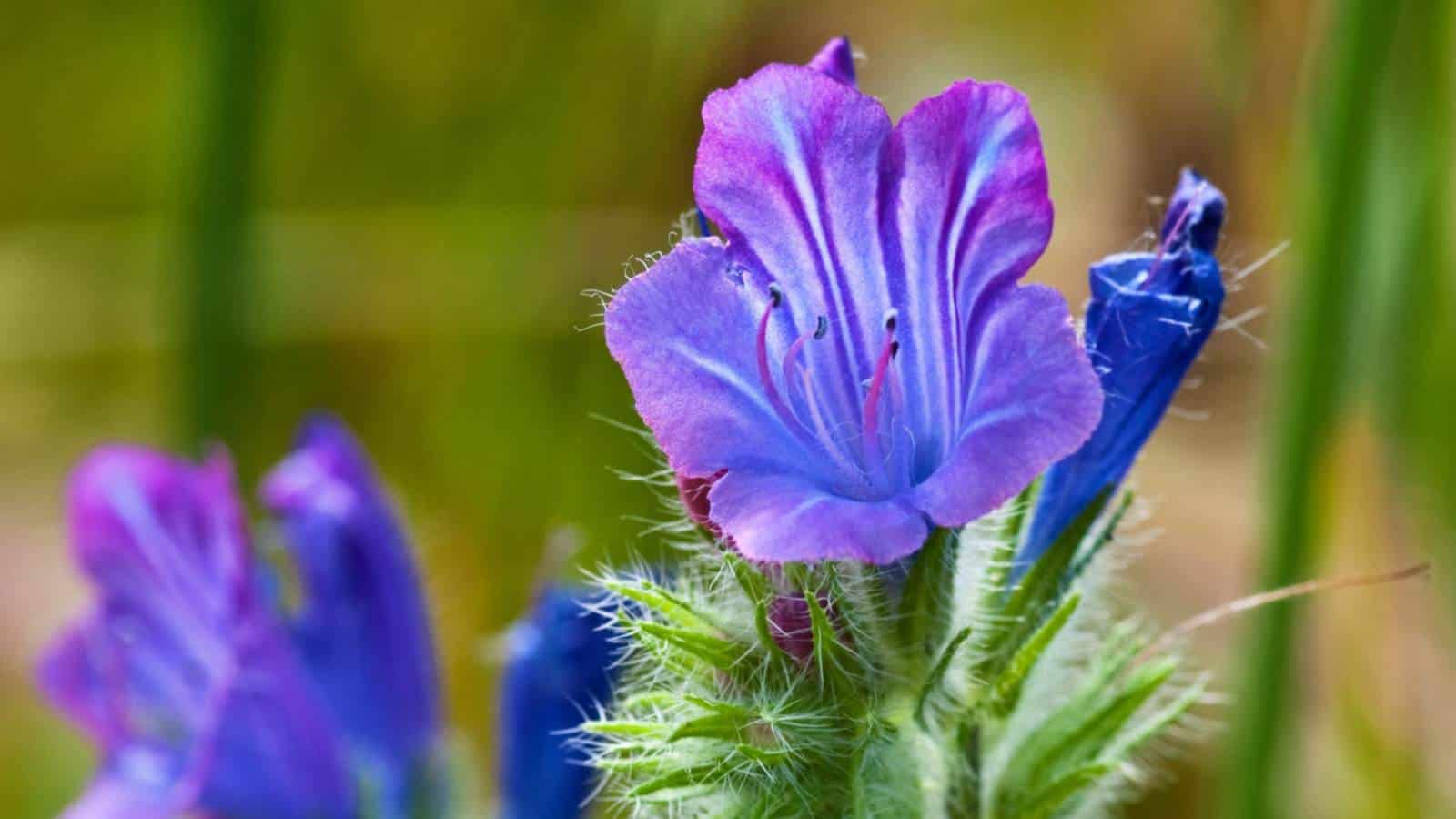
- Botanical Name: Echium vulgare
- Hardiness Zones: 3-8 (USDA)
- Plant Type: Biennial/Perennial
- Sun Exposure: Full Sun
Blue Viper’s Bugloss bears spires of bright blue, bee-friendly flowers. It’s a wildflower that adds a touch of wilderness to gardens.
Other Flower Guides from Planet Natural:
Garden Warriors: Flowers That Grow in Poor Soil
17 Mesmerizing Flowers that Bloom After Dusk
12 Perennial Blooms Defying the Cold – Flowers That Bloom in Winter











